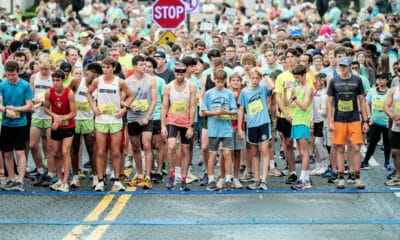Business
Capitalist Sage: Laron Walker Scaling IoT Technology from Education to Commercial
Published
5 years agoon
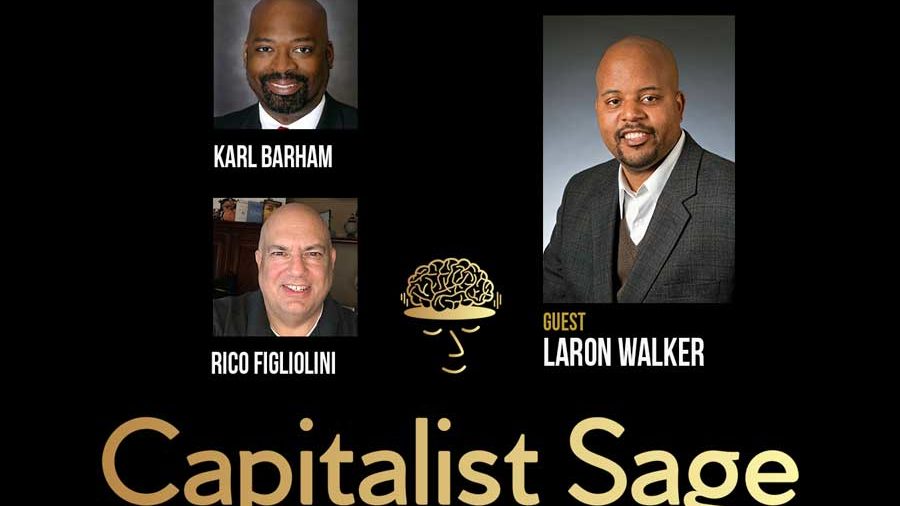
Today’s kids are learning advanced technology thanks to Mantis EDU and our special guest, Laron Walker. Join Karl Barham and Rico Figliolini as we learn how our children will fill the tech jobs of the future. Laron talks about the real-life implications of learning tech-skills young and how hands-on learning is the way to a brighter future.
Resources:
Mantis EDU
Website: www.MantisEDU.co
Twitter / Linkedin: LaronAWalker
Sciberus
Website: www.sciberus.com
Facebook: https://www.facebook.com/Sciberus/
Phone: +1-404-478-2050
Podcast Transcript:
Karl [1:11]: Welcome to the Capitalist Sage Podcast. We’re here to bring you advice and tips
from seasoned pros and experts to help you improve your business. I’m Karl Barham with Trans
World Business Advisors and my co-host is Rico Figliolini with Mighty Rockets Digital Marketing
and the Publisher of Peachtree Corners Magazine which is due out soon. Hey Rico, how are
you doing?
Rico [1:29]: Hey Karl. Really well, thanks.
Karl [1:32]: Fabulous. Well let’s start off by introducing some of our sponsors for today’s show.
Rico [1:37]: Well, we gotta say thank you to Atlanta Tech Park for letting us use their great
podcast space. They’re located here in Peachtree Corners. They’re a tech accelerator here in
Peachtree Corners. A tech hub offering work space, event space. In fact, yesterday and the last
two days they had Thin-Tech here. Really big financial, technology, that had former KGB Agents
here talking in one of the panels. Quite a few things going on here, it’s an excellent place where
a small companies can grow. We love being here. Our other primary, if you will, sponsor is GMC
Primary Care and Specialty Center. They just opened here in Peachtree Corners. And they’re
originally part of the Gwinnett Medical Center that’s been bought out by Northside Hospital now.
They’re part of the greater Northside Hospital set-up, so we wanted to welcome them. They’re
primary care and they have specialty centers right in the mix. They have their own X-Rays and
Mammography and other technology that they can refer within the center.
Karl [2:40]: Oh, fabulous, fabulous. So as the community continues to grow, we’ve got a town
center, we’ve got medical, we’ve got Atlanta Tech Park. Incubators as the town keeps it up. But
following along with the theme of how Peachtree Corners is growing and technology in general,
today’s guest is Laron Walker. He is the CEO of Mantis EDU. Here to talk about taking IOT, the
Internet of Things, and related technology and applying it from the space of education all the
way through commercial applications. How are you doing today Laron?
Laron [3:15]: Doing well. Thanks for having me.
Karl [3:17]: Fabulous. Well why don’t you start off by telling a little bit about yourself and your
background and what led you to play in this field.
Laron [3:24]: So I’m a native Atlantan. I grew up in South-west Atlanta within a ten mile radius of
the downtown area. As a kid I was always kind of the tinkerer. You know, I had businesses
where I was cutting grass and working with things. I remember a story once where I had an old
Cable-box. This was before we had smart-homes, but I had a remote control, and the family had
no cable. So what I did was I found a bunch of lamps, I found an old fan, and I plugged it into
the back of the cable box because I knew that when you turned it on the power came on. And
thinking back around that I had one of the first smart homes. Like out of my bed, I pressed a
button and my lights came on and in the morning I turned it off. So I was always tinkering and
doing things. I attended a lot of public schools. One of the earliest memories I have around
engineering was that when you were in Middle School on the way to high schools, magnet
schools, you had to choose a career path. And so my brother attended Frederick Douglas High
School, which happened to be an engineering magnet school. Really good school. Back then,
the choice was, ‘Do you want to choose electrical or mechanical?’ And I chose electrical
because I knew how to play with wires. Had no clue that electrical engineering was a totally
different source. I got there, engineering magnet school, then one day somebody came by and
said “If you have a thousand on the SAT and a 3.0 we’ll give you a scholarship.” And that’s how
I ended up at Tennessee State. So it was all those kind of happenstance-type scenarios moving
down this path. But in doing so I got exposed to a lot of interesting people. So bringing it home,
Tennessee State in a very entrepreneurial date, this is the late-nineties, our department got a
grant. The idea was that they had to teach students how to build HTML. So I literally got paid to
learn HTML and out of that project, we built the first website for the Electrical Engineering
Department in our school.
Karl: [5:12]: Wow.
Laron: [5:14]: And the rest is history. I learned about code. I realized that building and having
tech skills was a way forward, and since that time I’ve been really focused on; how do I take
technology and tools to build businesses around that, that enable others to have a very similar
pathway.
Karl: [5:28]: You know, back in that time in the nineties, the Cold War ended and people started
shifting out of Aerospace and mechanical engineering. The internet wasn’t really a big thing
there but people were going to electrical engineering and it was more traditional. But quickly, all
of the sudden; the internet, electrical engineering, sensors. These technologies started
exploding. So if you were in that industry at the right time you were at the beginning of it when
they were just coming out with the first website like; Netscape, Mosaic, was back in eighty-nine,
those browsers. And look where it’s come to.
Laron: [6:08]: It’s funny man, like, I went to a summer pre-college program. This is ninety-six.
We went in, the physics teacher was a pretty forward thinking guy. And the assignment that we
had was to go to the internet and print out the five-day forecast for our city. Just to force us to go
and think about the internet and how it can be used and what you can do with that. So just
thinking about, even in the late nineties, some people had not been exposed to those
technologies.
Rico: [6:34]: You couldn’t just google it either.
Laron: [6:37]: You couldn’t google it. But the ironic part is this though and that brings us to
today’s conversation: Those divides are growing like crazy today. And this tech is not being
exposed to our kids. They’re in school learning things that are not applicable to today’s jobs.
People don’t understand that’s the case and I think that’s a really big issue.
Karl: [6:55]: Give me an example of some of the technologies that you’re seeing now that you
would say young people should really get comfortable with mastering early on.
Laron: [7:04]: Yeah, so right now we all know there’s huge talk about autonomous vehicles,
machine learning AI. And those sound like really interesting buzz words that are very
complicated. Truth be told, even in industry now, most of that technology is being outsourced to
providers like Microsoft, Google, etc. They’re ending within web services right? So not many
companies have a true cognitive ability within that. But knowing that the trend is to outsource
those functions you have to understand how to ingest and use that. There’s no reason why a kid
in elementary, middle, or high school now can’t learn how to ingest or call a web service to get
data. Because if you have that simple construct you’re now able to work with these people that
you can outsource data to. The point of black-boxes existing, I have an input, there’s an output.
Data goes from here to there, that’s a very generic concept that can be easily digested. And
then once you understand that as you go from elementary to middle to high school, over time
you may develop your own algorithm. Those are the type of things that are happening now. We
aren’t telling people like, “This is what the cloud really is. That’s how that works.” So kids now
when they’re aspiring to start their business or to build a product, they’re out trying to build
things that in real life that I would just go pay one cent for. But nobody’s ever shown them
practical ways to do those things so they can start solving these issues.
Karl: [8:18]: Got it. When you think about kids in school now, how can they learn and start to
grapple with some of this. What have you found that pieces it together?
Laron: [8:29]: That’s what we’re doing here. So the cool thing about it is that on our side, our
focus is this: There are two issues. Most of the companies that are building tools and tech and
hardware and things like that, they’re primarily focused on consumer-type markets. So recently
for instance, Sphero is a real interesting company. Robot that everybody got exposed to made a
lot of money selling Star Wars-themed robots. You know when a movie dies down the buzz dies
down, you can’t really sell those products and then they’re pivoting the education. But there’s a
different thing when you’re selling to schools. Teachers want to know about curriculum
standards and have professional development and standards alignment. The people who make
devices aren’t coming from that vantage point. So on our side, what you do is that, we say well
great. First of all, the purpose of these tools that we’re describing is to teach math and science
and physics. So then how do you take those scenarios and route real-world examples around it.
So as an example, we did a couple of camps this summer over at Clark Atlanta here in Metro
Atlanta area where the kids are learning about intro to coding, computing precibles, sensors,
and then the use-case combinated with an aquaponics system.
Rico: [9:34]: What’s this for?
Laron: [9:35]: Aquaponics is using water and contained environments to grow plants and
vegetables. So that’s a real world issue, food doesn’t exist. So I can teach you about a climate
sensor that can measure environmentals. I can teach you about a plant sensor that can
measure plant health. I can teach you about how to measure pH and things along those lines,
so you have these core concepts. While you’re learning how to use those sensors I can teach
you about things like plots and graphs and cloud, which has those standards. But to get you
excited about it, I’m not gonna leave it there. Let’s go and put some goldfish in a bin that are
peeing, making ammonia. Then ammonia creates a nitrate, nitrates create nitrites, the nitrites
are being taken in by the plants and the plants are now going to produce a vegetable. And this
is happening in real time. This is being done in a way to where a middle school kid can program
a tool called Scratch, which is the prevailing tool in the market, to make that happen.
Rico: [10:24]: You know that’s interesting. We were just listening to something about Google X.
The X Company. How they are experimenting right down to the plant. They’re talking about
farming and almost exactly what you’re talking about. Sensors down to the plant level, not just
the field level. And knowing every single plant, like plant number two-thousand-thirty-eight.
Laron: [10:45]: Listen to what you just said though. Right now there are staffs out there saying
that most of the jobs that will exist in 2030 are going to be from out of today’s pipeline. There
are staffs out talking about how our kids aren’t excited and motivated. The challenge is this:
Most people that we’re describing that actually are building tools and things that are being put
into our schools and programs aren’t aligning to what companies care about. Now imagine
when the person that google leaves, the program manager that you just described. Imagine
what happens when he or she goes to a school district and you say “Hey, this entire school,
these kids know these concepts. Here is a miniature version of what you’re doing in real life.”
You don’t think they would get behind and support that?
Rico: [11:24]: They probably would.
Laron: [11:25]: They would, right? Because for the first time ever you’re not taking a company
and saying ‘Support this program,’ and give them a bumper sticker that says ‘I support kids.’
You’re actually authentically connecting what they’re doing to what’s happening. And that’s the
piece that I think is missing.
Karl: [11:39]: And feeding their pipeline for talent. Because they can’t find enough people that
have the skills to invent the future that they’re imagining.
Laron: [11:51]: That’s it.
Rico: [11:52]: Well and you know, I think that’s why stem schools are popping up everywhere.
Because the idea is now, they’re shifting to the idea that you don’t need a four-year college
degree. You can come out of high school knowing programing, knowing these things, and you
have that skill.
Laron: [12:03]: The disdain of not having a four-year degree is disappearing.
Rico: [12:06]: It’s moving away.
Laron: [12:08]: Right. And even people with four-year degrees. I always joke about it man. So, in
my history I stopped at Tennessee State, but I left Tennessee State and went to Purdue.
Because I was told that, get the highest degree you can get. So back then I went to
USAToday.com and I looked. University of Michigan and Purdue and Georgia Tech were the
top engineering schools. Somebody told me, I could’ve gone to Ann Arbor, I could’ve gone to
West Lafayette. Michigan was past Purdue, so I stopped in Indiana. I joined the direct PhD
program because that was the best degree. I spent five years in a PhD program and I got an
MBA. But at the end of the day when you think back on it, I got a lot of theoretical skills in the
classroom. My lab-work was what got me the hands-on skills. But truth be told, knowing what I
know now, I would’ve been much better suited going to Devry for a couple of years. Just to get
some actual hands-on skills and then supplemented that with some business. Because people
don’t get the hands-on. I keep saying with our kids, if we could expose to them the ‘how,’ that
would help them get intrigued and figure out the ‘why.’ And to me that’s why I focus on things
that are tangible, real-world, to get you excited. Then more importantly we are, unlike some of
the more industrial or commercial companies, we are building programs that can sit within the
construct of a school. Because ultimately this has to be something that can be taught and that
can be expended as a program across the board.
Karl: [13:30]: So tell me a little bit about some of the projects that you’ve developed and kids at
work, how it’s helping them learn skills.
Laron: [13:38]: So a couple of examples. So our spirit of influence today is really focusing on
things that can happen within an after-school program. A stem camp or summer camp type
experience, because I think that’s really interesting. If you look at the space today; anybody with
young kids, elementary, middle school kids, who are doing after-school or summer experiences.
Truthfully most of those programs, even if they are stem based programs, are glorified
babysitting operations. And I think that’s an issue, so we started there. And then we also play
within a space of some corporate partners who are engaging kids. So a good example would
be, Microsoft has their band program, which is like their backs of Microsoft employee research
group. So every year they bring in a bunch of kids from high-schools, expose them to tech. We
have a session with Microsoft and we bring our environmental sensors for this use-case. We
say, “Hey guys, let’s do a use-case around co-chain logistics.” Something shifting through the
supply chain. We gave them an environmental sensor, we gave them a package. And they had
to write some code to be able to determine like, pull off the sensor data things like temperature,
humidity, and pressure. And the idea was that, if there was an outlier. We gave them a hair
dryer or blower to raise the heat, and the thing was like; “Hey, let’s write a program so if this
thing gets this high above a threshold, it has to alert you.” So that we give them a STK that
sends text messages. So every group had to sit back, think about it, write some code,
experiment with that. Before that they got a whole talk around cloud and how it worked. Like
“Hey guys, how do you send SMS’s? Well that’s an STK. That’s a company called Twilio. They
just went public. They make a lot of money just selling cloud services.” At the end of the event
every group comes up, they talk about cloud, how it works, IOT, control systems.
Rico: [15:13]: How old are these kids?
Laron: [15:15]: In this case, these kids were ranged. Like high school and up in that scenario.
But we’ve done the same thing below. Here in Gwinnett, we had a scenario with the elementary
school interestingly enough, there was a teacher at the school that had a kid that went through
the program fifteen years early. He’s a really smart guy. We would come by everyday now,
doing a weekend teacher’s crash course. The school had invested in a Hydroponic /
Aquaponics lab that was fully instrumented with plants growing. And we did a session with the
kids to show them how to use the sensors. So then what happened was, once they understood
how to connect with the sensors in Scratch, the school went and bought an LCD screen, hooked
on a Raspberry Pi, and the kids wrote code on the Pi. Learned how to read data from the
sensors and make a real-time dashboard.
Rico: [16:01]: Nice.
Laron: [16:02]: So now when the superintendent came by or visitors come by, you have
elementary kids talking about how they’re collecting data and how its being leveraged. The point
there is that, I know adults who’ve never seen a real-time dashboard or can explain how data is
ingested on a dashboard. So to me it’s like you take these tools, no matter whether its
elementary school or high school, the kids all use the same sensors and the same ecosystem.
But what you do is you graduate the tool sets over time as they get more exposure to expose
them to different parts of the equation. I think that’s the thing. So me trying to graduate a
progression that goes from upper-elementary to, actually I keep saying high school but it’s really
more K-20. Because to me this ends in the collegiate course or at technical school. You’re
basically saying, “Hey man, when you were at elementary school we didn’t really tell you that
sensors have dirty data you gotta run an average on, we just kind of did it for you.” You get to
high school and it’s like “Hey man, this is dirty, you have to go run an average.”
Rico: [16:57]: You know that’s funny. That’s almost like history. They teach you basic history but
they never teach you about the stuff, the really down and dirty stuff until you get towards high
school and college. You know, just the basic stuff.
Laron: [17:07]: So throwing the real stuff in there. So now when you finally graduate you get a
job at Google or you’re working on this program you’re describing, you’re like; “I’ve been using
this Google Cloud since I was in middle school.” And you already have the main context to dig
deeper. To me, that’s the holy grail that I’m chasing. I think the intersection of education with
industry and the proper community partners. That trilogy is something that I think is exciting that
can be expanded without a lot of strain on either part of the ecosystem.
Karl: [17:33]: So it’s an interesting model that you have. You develop a business, based on
technology, that’s having an impact on the community. So when you chose to go that pathway,
what made you choose that and are there things that you would do differently knowing what you
know now then what you started along this path.
Laron: [17:52]: So going down that path is really because I come from very humble beginnings.
Technology changed my life. Really. Because I was able to get a skill, like at Tennessee State,
where I was learning how to write code. I had a laptop, and because I had a laptop I started
building websites. I was able to monetize that. Without question, that’s the great equalizer. If
you look at the trend now, the wealthiest people in the world, most of those guys made their
money in tech. So tech is a great generator of wealth and legacy on the business side. But to
me, I also realized that the work I do like the non-profit, we support and give out scholarships.
That’s not sustainable, that’s just an outbound process. So my opinion is that, by having these
tech-enabled businesses our motto is this; I survey schools that are using tech as a part of their
process. Most companies that sell tech, particularly hardware, it’s not very profitable. Because
most people don’t make it themselves. So they take something they bought from somebody
else, they market it like crazy, and they sell it at the high end of the market. So what that means
is that the people that really need it don’t get access to it. Our approach here is can we build a
business where we can actually design hardware that’s best in breed, but informed by design.
That way, we can find ways to get it out there at scale. But then by doing that if I can expose
that to these ecosystems of undeserved people, even people who have connectivity to it, I can
influence and get them those skill sets to help them change their lives. Which means that,
they’re gonna pull back and pull people forward. So that’s kind of the theory behind it. The third
piece of that is the thing I would do differently, which I’ve been working on recently is that a lot
of people don’t understand the importance of education technology or the ability to do good and
do well at the same time. So it’s very difficult to raise capital or raise investment. Hardware in
general is an industry people don’t really invest much in, most vc fonts focus on software. And
then you go and have this education and kind of community slant and people think you’re a
nonprofit. So we’ve been trying to form this to show people that, ‘hey man, this is a real
business that we can scale.’ So to that point, the tech we’re using in these classrooms as I
described earlier is real world tech. So we now have started to work on institutional partners
where we can launch consumer products that take that same tech in a different vein to show
people that, not only is it used in schools, but it’s in this big retailer. There are a lot of ways to
make it happen.
Rico: [20:09]: You know the best part is, is that I think because of the way the market here is in
the United States and probably in a portion of the world. What you’re doing is saying, “Don’t just
do this because it’s just for the kids,” you’re saying, “We’re gonna show you commercial
application that can actually make money in the marketplace.” Because if it can’t make money, I
mean in the long run, you lose anyway because it’s just gonna fall by the wayside. No one’s
going to invest in something where it’s just altruistic and stuff. That’s such a short term thing. But
if you can prove to them that there’s money to be made here, this is a commercial application,
then people will definitely get involved in that.
Laron: [20:49]: So definitely before it was more of the mind instead of, we’re doing this work that
has great value, running these programs, and it was really purely about the kids. That’s still the
case to this day. But I have had to change my hat and just make sure that I’m making people
realize that this is a way to try revenue that can scale. This is a growth market not only
domestically but internationally. And the way in which we’re thinking about this is completely
different from everybody else. And if you’re in this space, you know Microsoft, Google, not only
are we supporting and helping you build pipeline. We are building solutions and products that
marry very well with things you sell in the schools. So my solution paired with your Chromebook.
My solution paired with your Surface Tablet. It’s a way to drive consumption, to drive cloud
computing, to get consumers hands in front of your products in a natural way that fits into your
strategic plan. And so that’s the way that we’re framing the conversation.
Karl: [21:43]: So one of the things I noticed is, you know IOT and these technologies can
change with time. I’m gonna ask you to put on your hat and look into the future a little bit, what
are some of the areas where you think the IOT smart technologies can have the most
transformative impact on businesses, specifically, and in communities.
Laron: [22:04]: So in the business side, what’s interesting about it man. People talk about IOT,
the big market in IOT is the IIOT. The Industrial Internet of Things. There are a lot of factories
out there and disparaged systems that have been around for years and they can’t just go out
and buy the new Apple Watch whenever the new version comes out. And that’s the interesting
thing when people are looking at innovation they go and hire kids that just graduated from
school and those kids are trying to make Apple Watches. That’s sexy. And it’s from lack of
understanding, they’ve never worked in these dirty jobs. Think about that show Mick Rowe used
to have, Dirty Jobs. Think about all those dirty places he went into. They need sensors too. And
so those little things that can’t be connected or if you go and connect this thing you can’t go
change out the ERP and it can’t use 5G but it’s still has a signal on it. Those ground filled
applications, that’s an interesting spot. There’s millions and millions of those out there and
nobody’s thinking about it. They’ve still gotta get connected. So things like that are very, very
interesting on the industrial side. On the consumer side, again these titans out there controlling
the ecosystem, so the Apples of the world are very forceful of what you can do. And how you
can do it. So I think as we find ways to get more connectivity as cities are employing WiFi and
things the varied connectivity disappears, you’re gonna see a lot of those applications happen. I
think in the home. Look at what Amazon is doing now. Amazon acquired Ring. Amazon
acquired Ero. That tells you that the home is a place where a lot of stuff is happening, so I think
you’re gonna see a lot more stuff happening within the constructs of a home. I think what’s
gonna happen in the future is that this notion of having to rely on an outside third party to give
you all these things. It’s gonna be just like in the enterprise there was this BYOD type approach.
I think you’re going to start seeing that. I think frameworks are going to start to exist to allow you
to more plug-and-play stuff to create your own experience around it.
Rico: [24:11]: Do you see the, I mean I see it and I’m not sure if maybe I’m wrong. Do you see
the closed environment that they want to create. I mean AWS, the cloud.
Laron: [24:23]: I think it’s a problem though. I’ll give you a good example. Actually the other day.
So, I’m a pretty technical person. I can write software and I have a hardware company. But even
right now, I can’t go home and take one of my systems my company produces and put it on my
network at home without going crazy. All the major players, they have taken a traditional
approach. They’ve invested in some technology that they chose in that technology plan seven,
eight years ago, ten years ago. They’ve already advertised the cost of it and they’re forced
everything they do to go down that path. And they’re keeping people from getting involved with
that. And see what that does? So now you go into the home and there’s already connectivity
there. You have a security company there. You have all these connected people and Amazon
comes with an Alexa and jumps on your hotspot, takes over the whole house. Because the
other pieces were closed in that forward thinking. So you have to open that piece up because
there’s no one-size-fits-all.
Rico: [25:13]: But do you see Amazon wanting to open that piece up?
Laron: [25:16]: I think those guys are opening up connectivity to try and force you towards their
cloud.
Rico: [25:21]: Okay. That’s what I was thinking.
Laron: [25:23]: And so you have to be careful in terms of if that’s part of your business or not.
But the fact that there is an Alexa there that has a bunch of users that I can plug into. That’s an
interesting value proposition. It’s just a matter of what happens with the data that you have to be
careful about.
Rico: [25:34]: Do you think education can work well with it too. I know AWS allowed it because
of their AI. They’re saying that you could use their AI to develop your own.
Laron: [25:44]: But that is the Playdoh, so that is the opportunity. And that was my point earlier.
So now let’s go back to the scenario of now we’re growing food. This food has a myriad of
sensors. So imagine now would I want to go in and deploy this to an impoverished
neighborhood who doesn’t have the skillset. And I can now go and have them collecting data
going back to the cloud. Now, we’re in Georgia so what do we have? We have UGA. They focus
on some ‘Agg’ stuff. There’s probably a PhD there who wants some data. You don’t think we
can build a system using AWS or Azure or where we can feed this person all this data. They
can tune their algorithms they can tweak it, they can test it in these neighborhoods and now
we’re getting yield. It’s those kind of things that I think are going to change the education
concept. The second thing is that, there’s a huge push now toward online and virtual learning.
But it’s still a very traditional construct there. Let’s go take a class where we’re throwing
information at you where you’re watching some videos. In our case what we’re working on is
imagine a day where I could have a remote science class. I’m gonna send you a sensor, you’ve
got to go outside, collect some data. You’re gonna submit something digital with that. We could
have a digital lab experience. We are we not doing that? And so I think that’s to me, as we
identify the right cloud partner and I could take that to scale, now we can export the stuff across
the country. Across the world and have a common experience around it.
Rico: [27:10]: I can see. I mean having Amazon as a partner and being able to do that. Then
deliver this stuff within hours, if not the next day anyway. You’ve got that whole environment.
Laron: [27:21]: That’s it. So what I’m trying to do is show that, we have done an amazing POC
around ways to engage kids within tech that’s aligned to teaching. And now that we’ve had this
five or six year MVP that we’ve been cranking out by ourselves. We’re at a point now that with
the appropriate partner who’s a philanthropic capitalist, we’re going to go and scale across the
globe overnight. Because we’re properly aligned and our synergies are right in line with that.
That’s what I’m chasing.
Karl: [27:58]: Wow. Fascinating. Well I’ll tell you, you know we’ve learned a lot today about how
technology is being brought from schools into commercial apps. And what I like is, one, there’s
folks out there that are listening and this might spark an interest in them to pursue. How can
they get involved. How can they reach out to learn more about what you’re doing. What are
other resources in the community where young people and their parents and also business
owners can start changing their business model to capitalize on some of the stuff that’s out
there.
Laron: [28:30]: Well I’m pretty easy to find. So on social LaronAWalker is where you’ll find me.
I’m more of a Twitter and Linkedin type of guy. So you’ll find me there. As relation to the
business, the website is Mantis, like the spider, EDU, as in education, .co (MantisEDU.co) is our
website so go there. We’re launching a new website very soon. A lot of interactive blog content
there. For the different people you mentioned there the different constituents types we have a
lot of forums there to be involved with. So if you wanted to be a part of one of our stem camps
or summer camps, let us know. If you’re a company who wants to not only engage with kids but
you’re interested, say “Hey, can you help me pull together some content around this domain
that lines what I’m doing so I can present around things that I care about.” We’re making it
happen so find us online, connect with us, we’d love to partner.
Karl: [29:21]: Oh fabulous. Well, I’ll tell you. I love when we get to talk to a different kind of
business. Most people wouldn’t realize that you can take a technology business and have an
impact on people in the community with a vision towards the future that’s feeding the pipeline of
industry. The folks that are out there doing what you’re doing I think are setting the groundwork
for different generations. So when you hear Silicon Valley say they can’t find people to fill all
these tech jobs, I think that help is on the way. I’m glad that people like you help in leading that.
Laron: [30:00]: Thanks for helping me share the story.
Karl: [30:01]: My pleasure. I’d like to thank Atlanta Tech Park for hosting the Capitalist Sage
Podcast and thank Laron for your time today sharing some of the stuff you’ve done. That’s just
the tip of the iceberg of some of the things you’ve done and you’re working on to help in the
community and help transform the way people look at business. Atlanta Tech Park is a great
place to kind of help nurture that further. Find other like-minded individuals, take hardware and
software and apply some business sense to it, find good applications and ways to do that. It’s
really important. I’m Karl Barham with Trans World Business Advisors I get the pleasure of
working and meeting with great entrepreneurs and business owners out there. Helping them
figure out their strategy to grow and when they’re ready, how to exit their business. So you can
reach me at KBarham.TWorld.com or visit www.TWorld.com/AtlantaPeachtree . Reach out. And
Rico, why don’t you tell me a little bit about what we’ve got going on. I feel like there’s
something coming in the near future for us to go take a look at.
Rico: [31:07]: There’s so much out there. You can find me, Rico Figliolini, on LinkedIn or
MightyRockets.com. I do social media marketing, content marketing, and video. Especially if you
need products explained in video I do that. I’m also a publisher, as I mentioned before, of
Peachtree Corners Magazine here in the city of Peachtree Corners. I am also the host of
several podcasts, a family of podcasts, including this with Karl who does the heavy lifting on this
show. So he’s done a great job here. I also do Prime Lunchtime with the City Manager and
Peachtree Corners Life. So we’ve done quite a few things coming up and the magazine will be
coming out. I think it’s hitting the mail, the post office next Friday. We are doing technology in
schools so we’ve covered several of the schools in Peachtree Corners let’s call it, like Paul
Duke Stem High School, Wesleyan Cornerstone Christian, Picnicville Middle. So there’s a few
schools that are being covered and what they’re doing in technology and how that helps them in
their education process. So that’s one of the stories, of course we’re doing Pets and their
People. And we’re doing a few other things including the Voices of Football, covering a few of
the announcers from Norcross and Wesleyan so that’s kind of cool. So just a lot of stuff out
there and we just went through that grand opening with the…
Karl: [32:26]: Lot of fun. Got to ride in a car without a driver and lived to tell about it. And so it’s a
lot of good things going on in the community. We really encourage people to get involved and
go out and see what’s happening in the community all around and participate. Be an active
participant. See what differences you can make. Well thank you everybody. Stay tuned for our
next episode of the Capitalist Sage Podcast. Thank you everyone. Have a nice day.
Rico: [32:58]: Thank you guys.
Laron: [32:59]: Thank you.
Related
Business
The Forum Gives Sneak Peek of New Eateries and Community Spaces
Published
2 days agoon
July 24, 2024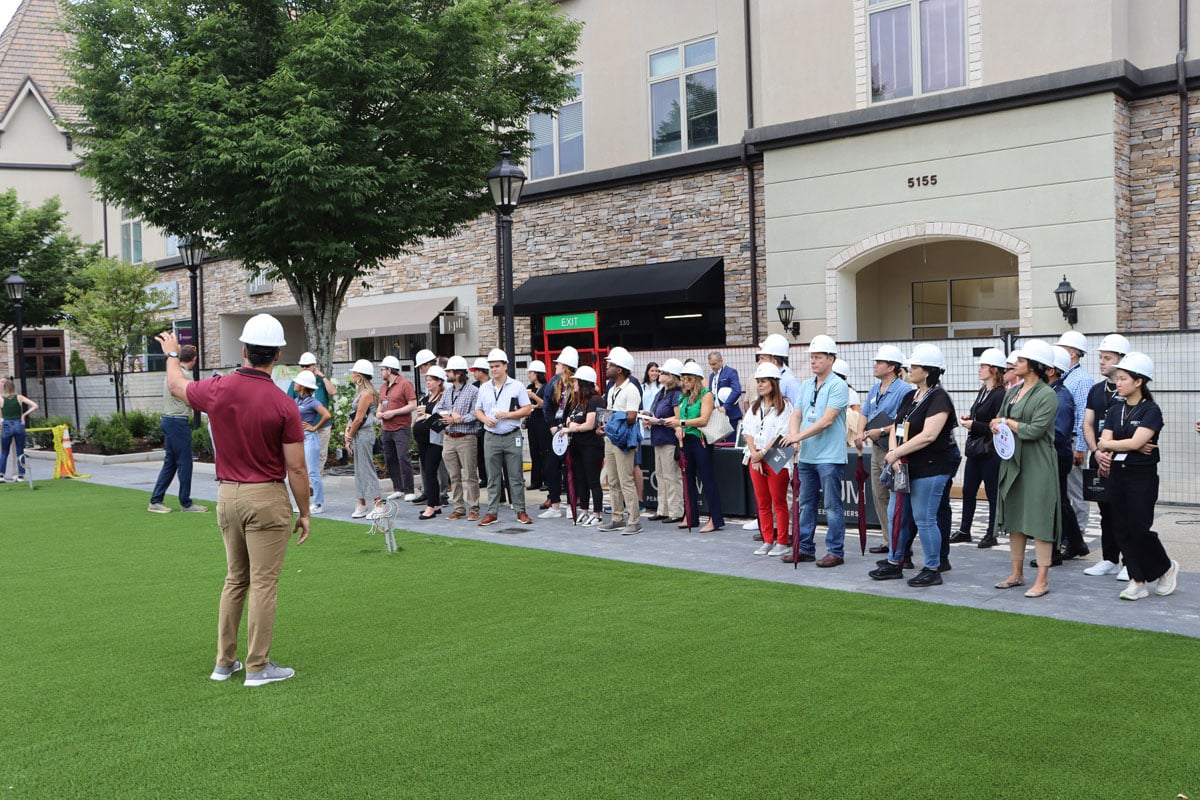
If you’ve been to or near the Forum in the past few months, you’ve probably noticed cranes and construction crews. The anticipation of the first phase of renovation of the 22-year-old retail center has left a lot of Peachtree Corners residents as well as nearby patrons excited to see changes.
The Forum administration invited the media for a hard hat tour on July 17. The event showcased the redevelopment progress ahead of The Plaza’s grand opening on Aug. 8.
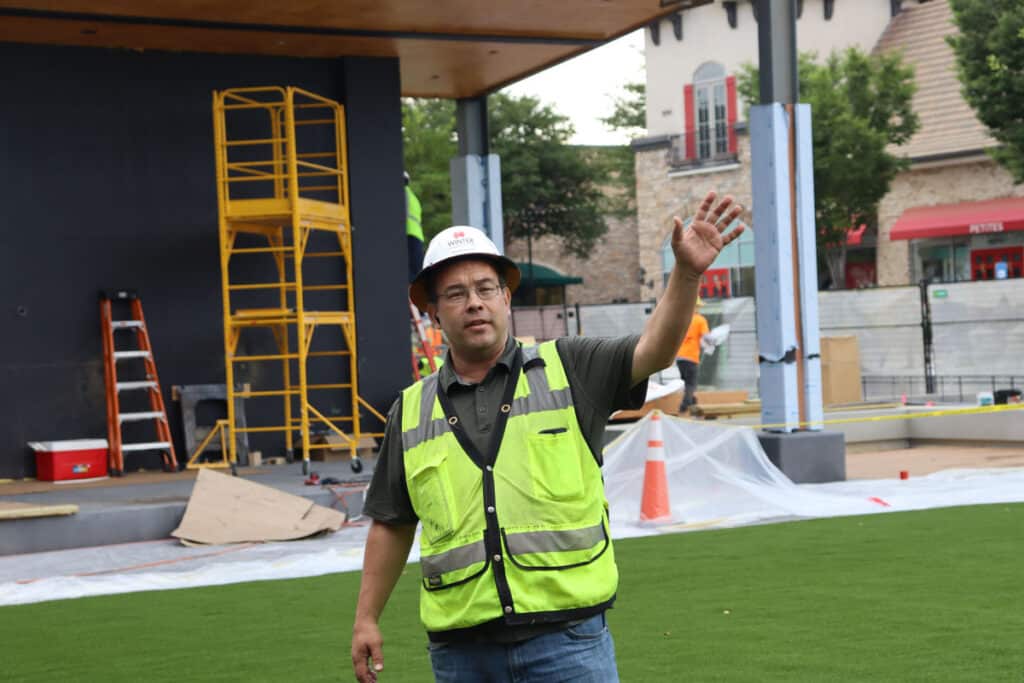
Scrumptious bites incoming
Executives from the development and leasing teams joined on-site management and led attendees around the new central gathering space, guest amenities and Politan Row, the newly created 10,000-square-foot food hall.
Dining concepts from veterans at Sheesh, Twenty-Six Thai and newbie Gekko Kitchen were the first food vendors announced for the space, which is expected to open in January.
“We can’t wait to introduce the Peachtree Corners community to our food hall experience,” said Politan Group CEO Will Donaldson in a news release. “Every detail from the design to the bar program to the cuisine is thoughtfully curated to inspire guests to not only mingle with one another but to connect with our incredible restaurateurs and discover new favorites.”
During the tour, Donaldson explained that eventually there will be seven different global cuisines in the Politan Row food court at the Forum featuring well-known and up-and-coming local talent. Once complete there will be a central bar, a private event venue and a covered outdoor patio.
“One of the things that we’re excited about is this unique design that we’ve come up with, that’s very specific to this area,” he said. “We’ll be open seven days a week for lunch and dinner. Whether you’re with a group for lunch or with your family, it works great for multiple settings.”
Twenty-six Thai owner Niki Pattharakositkul said the restaurant will work with local vendors to source the freshest meats and produce possible.
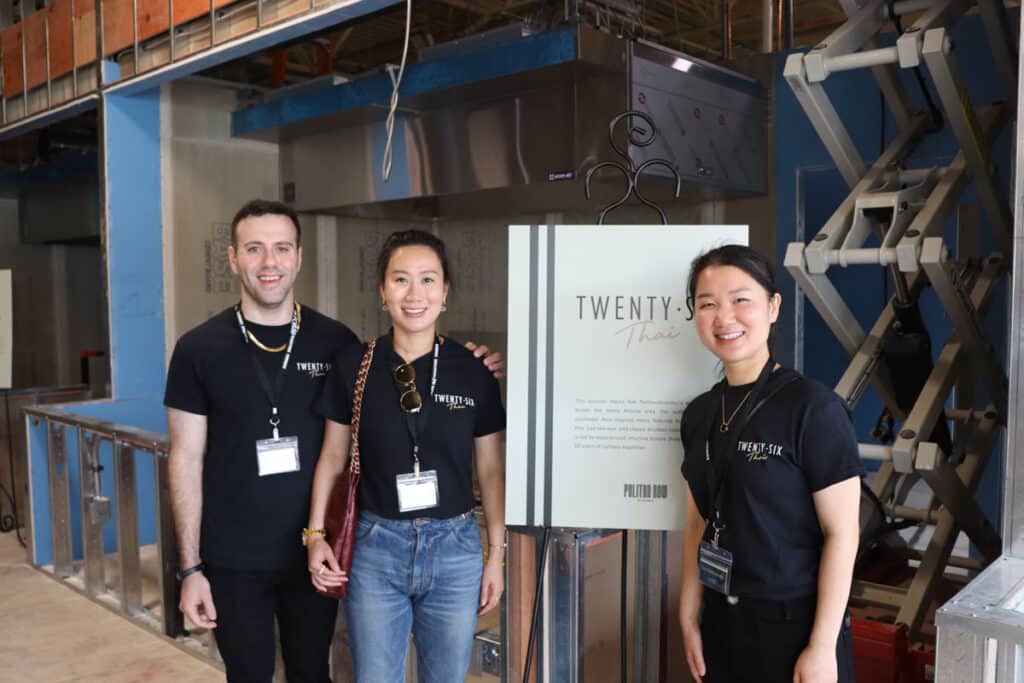
“There are certain types of produce and protein we try to source locally, but sauces and the more exotic produce and herbs, we have to import from Thailand,” she said. “Our brand is trying to move towards doing things locally and sustainably.”
Working with organizations such as Georgia Grown limits the use of large food distribution companies. Since starting Twenty-six Thai in 2016, Pattharakositkul has launched seven locations across metro Atlanta, including at Politan Row’s Ashford Lane and Colony Square.
The eatery describes itself as an “authentic wok-fired Southeast Asia-inspired menu featuring items such as pad Thai, pad see ewe and classic drunken noodles.”
Sheesh, a Mediterranean concept that uses simple, wholesome ingredients prepared with unique spices and blends, is run by corporate executive chef Charlie Sunyapong and director of operations Raquel Stalcup. The two are also members of the group behind full-service restaurants Stäge at Town Center and Pêche at the Forum.
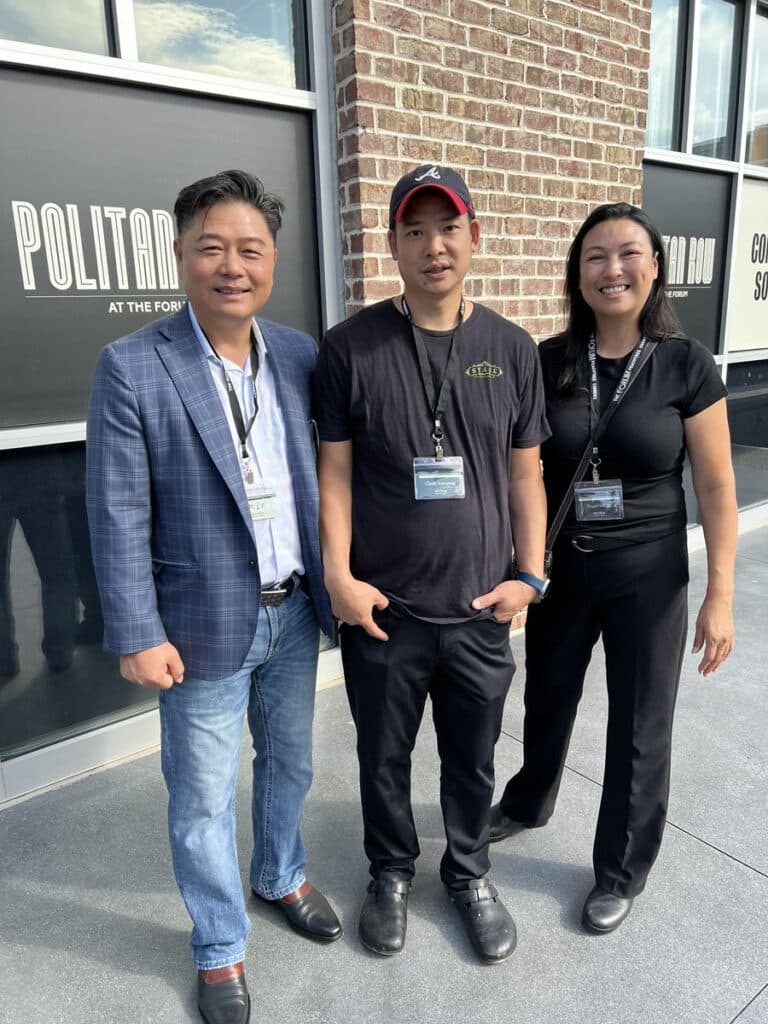
The popularity of those suburban concepts has already taken off. With Sheesh, they’re looking to do something different.
“There are going to be some things that are unique to Sheesh that you’re not going to get at the other places,” said Sunyapong. “You’re not getting a whole restaurant; this is quicker fare.”
Gekko Kitchen, a former food truck transformed into a hibachi and ramen experience, will be serving fresh, fast bowls that are more colorful and lighter than traditional hibachi fare.
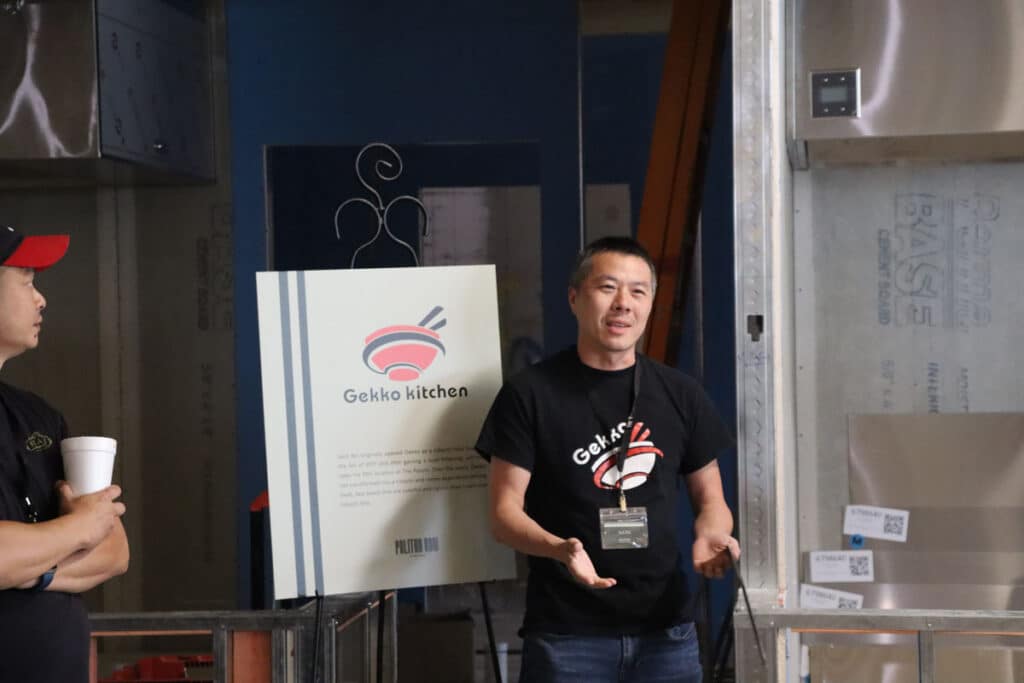
Gathering spots
Development Manager Nick Lombardo explained that NAP is moving away from building big construction projects from scratch like Colony Square in Midtown Atlanta and Avalon in Alpharetta.
“As a company, North American Properties pivoted around 2020 from building big ground-up construction to more redevelopment with already existing properties,” he said. “With the thought of great assets that just need a little more attention Infused into them to create value, we bought the Forum in 2022.”
He said that value-add propositions done at The Forum will create a more walkable center.
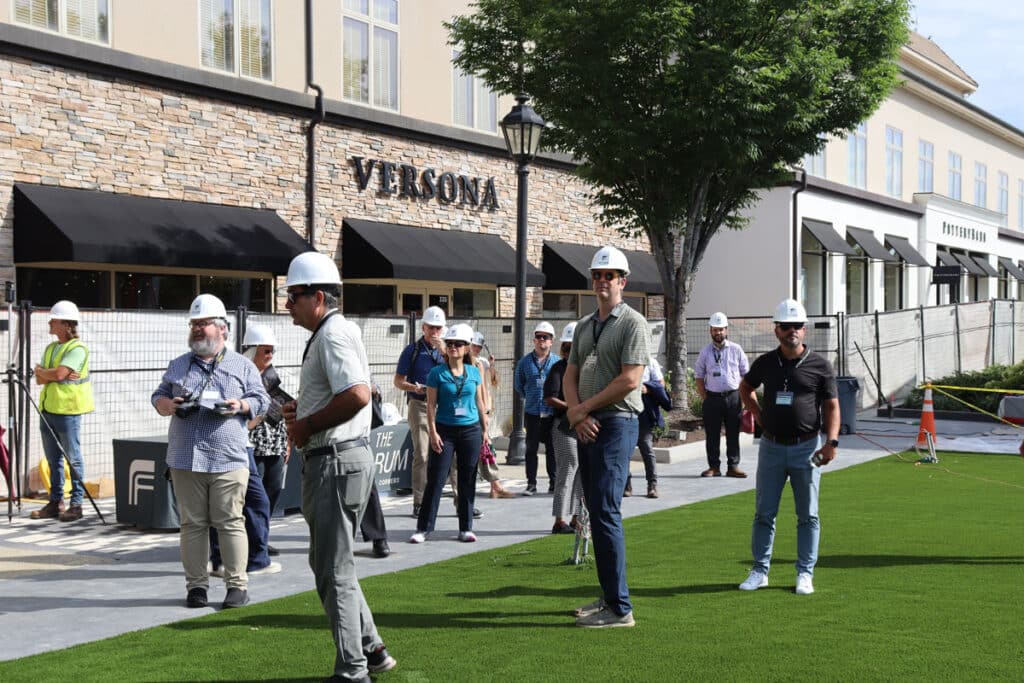
“Trying to compete with the internet on convenience is a very tough task, so the way we differentiate is by experiences,” he said. “We host between 150 to 200 events every year. We have things like concerts, wellness and fitness events and we have child playtime events. Our marketing team does a great job and they’re the differentiator when it comes to what makes our property stand out.”
By the first week of August, a large gathering space will be unveiled in the central area of the property between Pottery Barn and seafood restaurant Pêche. It will have a nine-foot LED screen capable of hosting movie nights and sports viewing. There will also be musical performances featuring local artists.
“We’re not in competition with Town Center,” said Charlotte Hinton, marketing manager at The Forum. “Town Center has gates like a real music festival and we’re more like a ‘chill and enjoy the music’ vibe where you can grab a beer and hang out or maybe kind of walk around.”
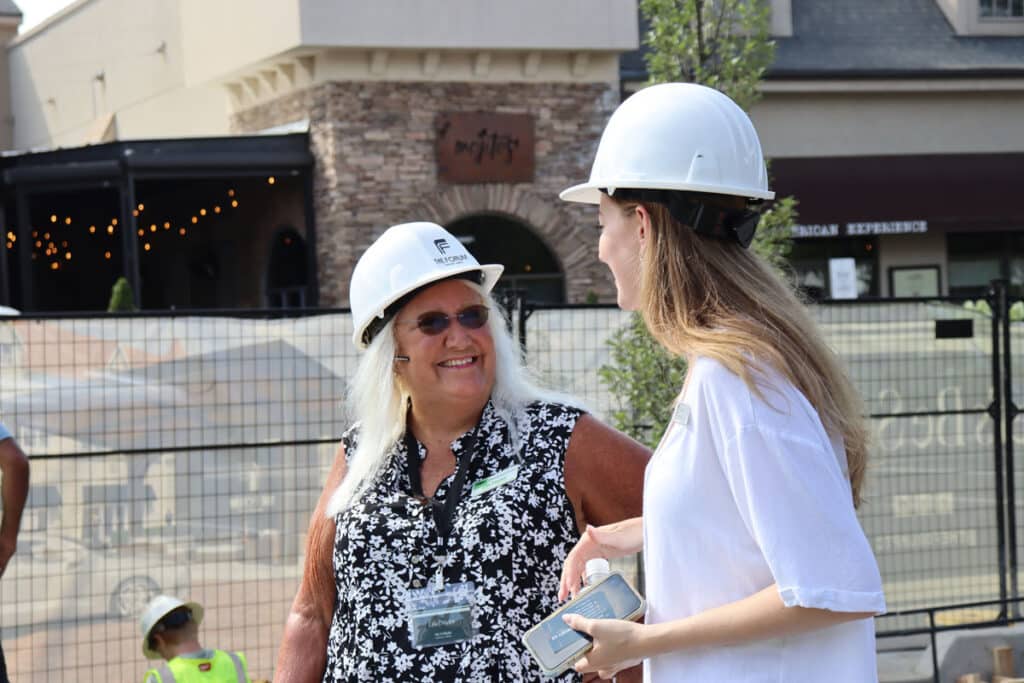
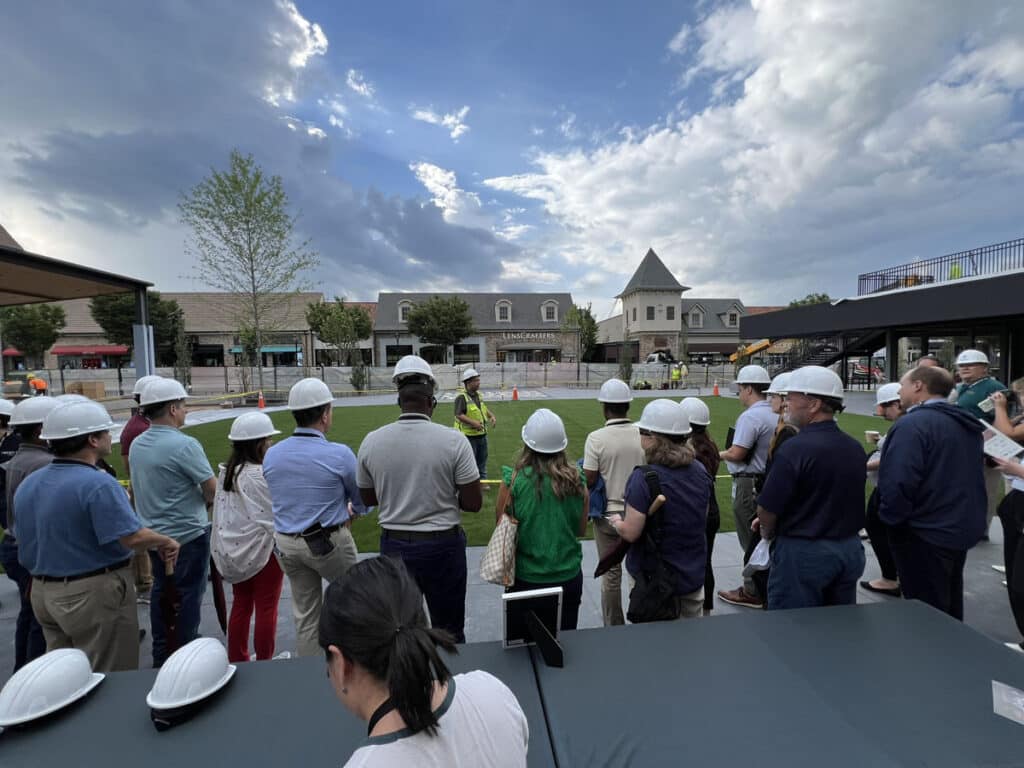
The smaller space and artificial turf are unlike the Town Center space where attendees spread blankets and bring chairs. The Forum will have furniture and seating in the space so folks can just gather and either enjoy time with family or partake in events.
The Forum will also offer valet parking on a limited schedule at that end of the property.
More improvements
Although the construction equipment will have moved out, the jewel box building will house a yet-to-be-named restaurant that will open early next year.
“We’re pretty much done with what we’re doing as far as landlord work,” said Lombardo. “We ask our tenants to bring their brand and their design and their material pallet and put that on the building to express their brand identity. They know their brand better than we do. They know how to best design their building and how it functions and works.”
It’s the same process with retail stores, he added.

“We always ask all of our new tenants to come in here when they’re building their storefront,” he said. “They’re not just selling their clothes; they’re selling a lifestyle in the brand so we ask them to push their brand out to the street.”
Even with the new spaces, there will be no shortage of parking, Lombardo added. “There’s plenty of parking behind these buildings,” he said pointing toward Pêche. “What we’ve done is enhance the connectivity to those areas. We’ve redone this breezeway and we’re adding lighting and connecting the parking lot to the main boulevard here. The goal is to replace cars with people and activity and bring a sense of community to the property.”
Related
Business
Taste of Peachtree Corners: PCBA Showcases Local Restaurants
Published
1 week agoon
July 17, 2024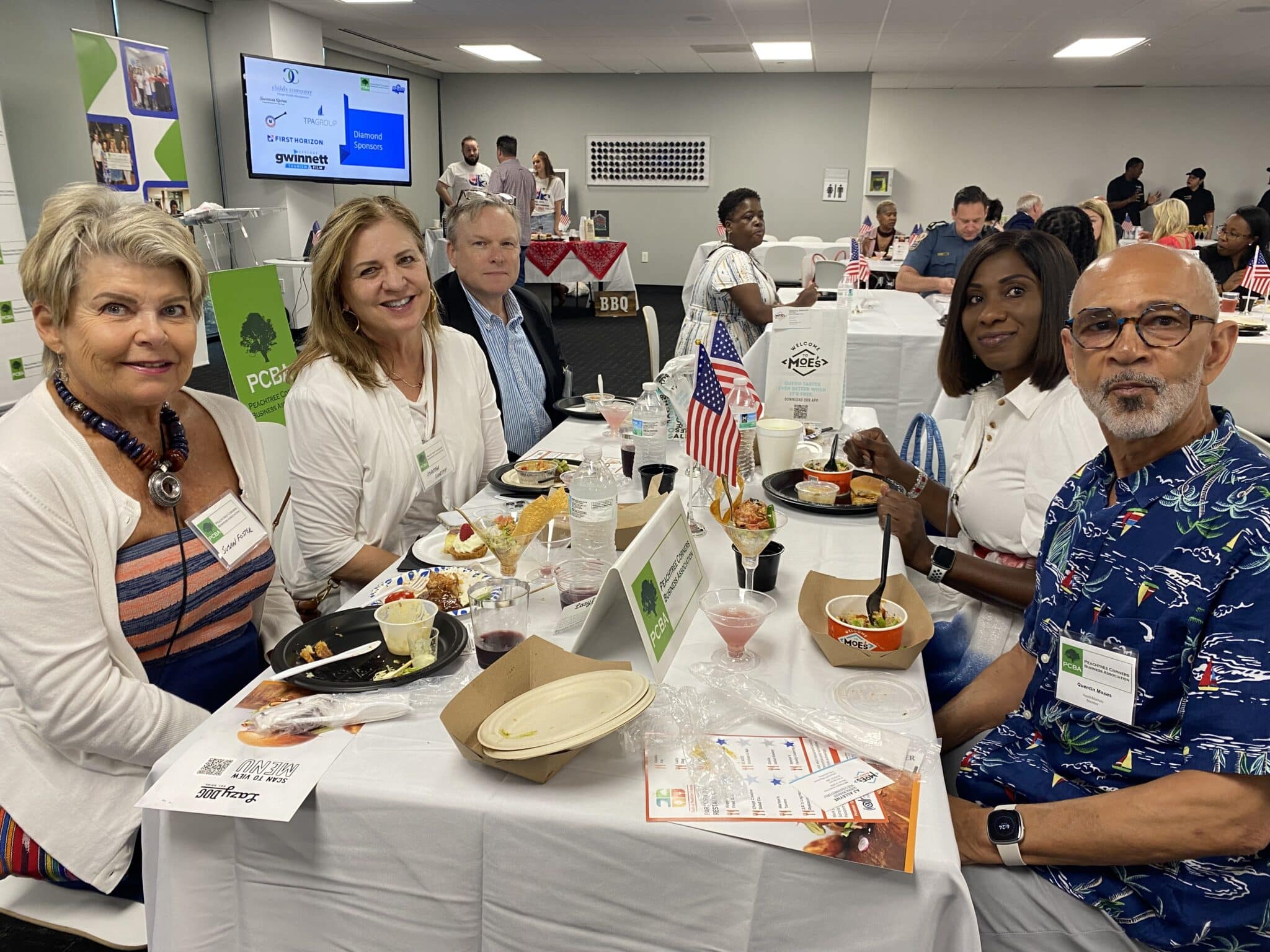
The Taste of Peachtree Corners has been in the works for years, but the COVID-19 pandemic put many key events on hold for the Peachtree Corners Business Association (PCBA).
But luckily this year, the dedicated staff of volunteers successfully executed a memorable event and introduced a lot of local business owners to their neighboring restaurants and caterers.
As I walked up to the Community Chest Room at Peachtree Corners City Hall on June 27, there was a line outside the door. I later found out that over 100 people had registered to attend the event. I got checked in quickly and was faced with a “passport” of 10 Peachtree Corners restaurants serving everything from high-end bakery items to good old-fashioned barbecue, and modern twists on seafood and American cuisines.
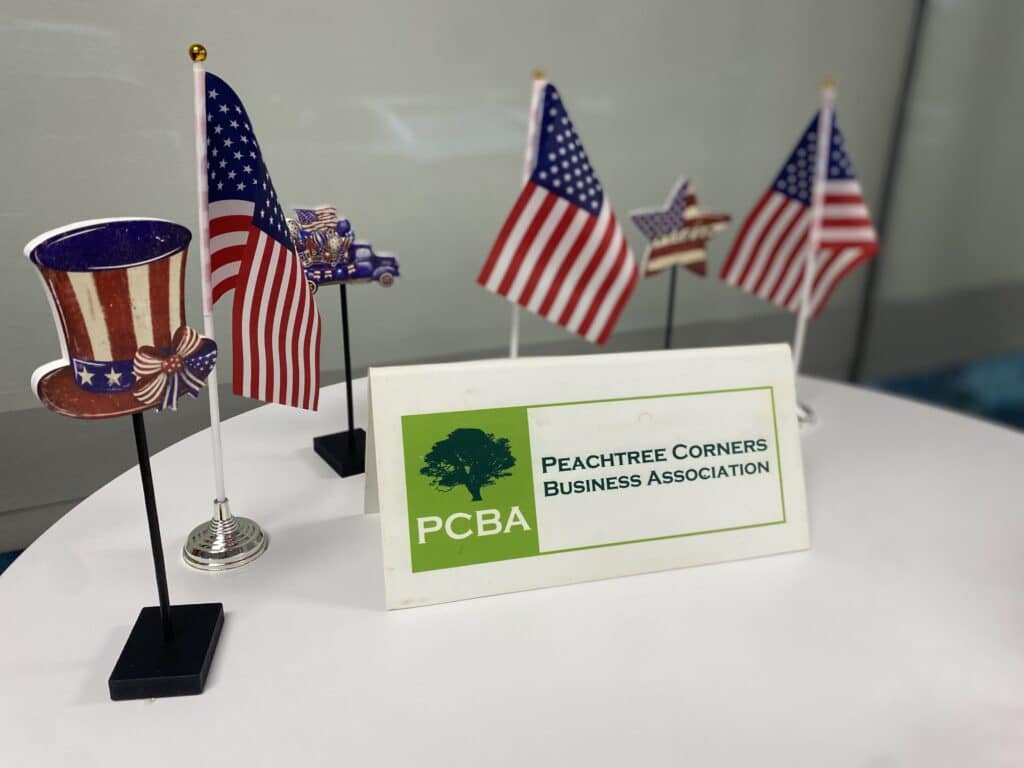
Let’s talk about the food
The idea was to visit all 10 restaurants and collect stars while trying samples and small plates. My first stop was Firebirds Wood Fired Grill, and they had my favorite – homemade chips and queso. The queso was smoky and mildly spicy with a great depth of flavor. What a great start. Next up was Chopt. Creative Salad Co. I had never heard of this restaurant before, but they blew me away with a perfect amuse-bouche of cherry tomato, pesto, mozzarella, and olive oil. These guys understand simple and fresh Mediterranean flavors.
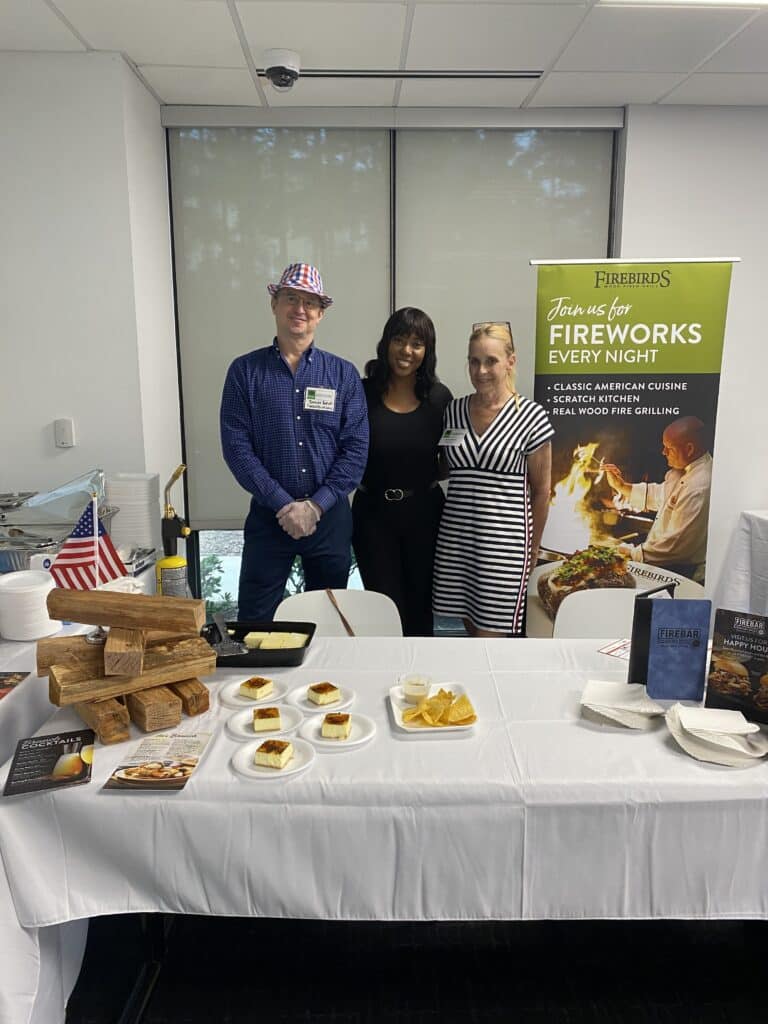
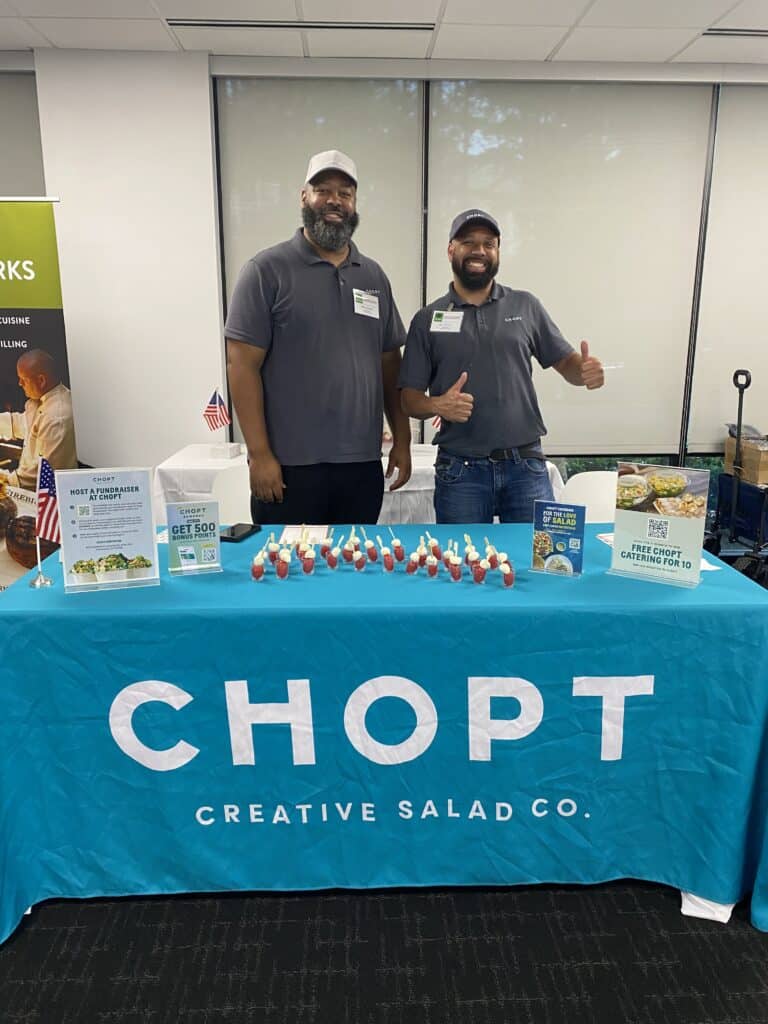

The folks from Marlow’s Tavern were also on-site serving shrimp and grits with jalapeno, spinach and tomato beurre blanc. This is definitely the style of elevated food I’ve come to expect from Marlow’s. And as a nice touch, they prepared a refreshing blueberry cocktail.
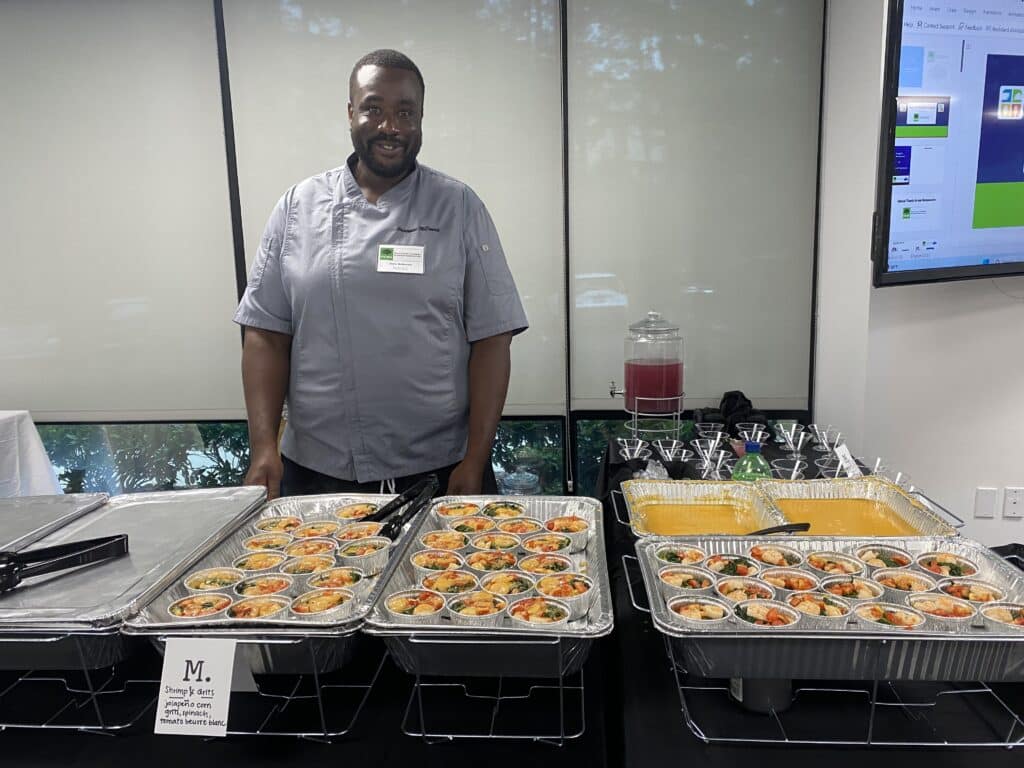
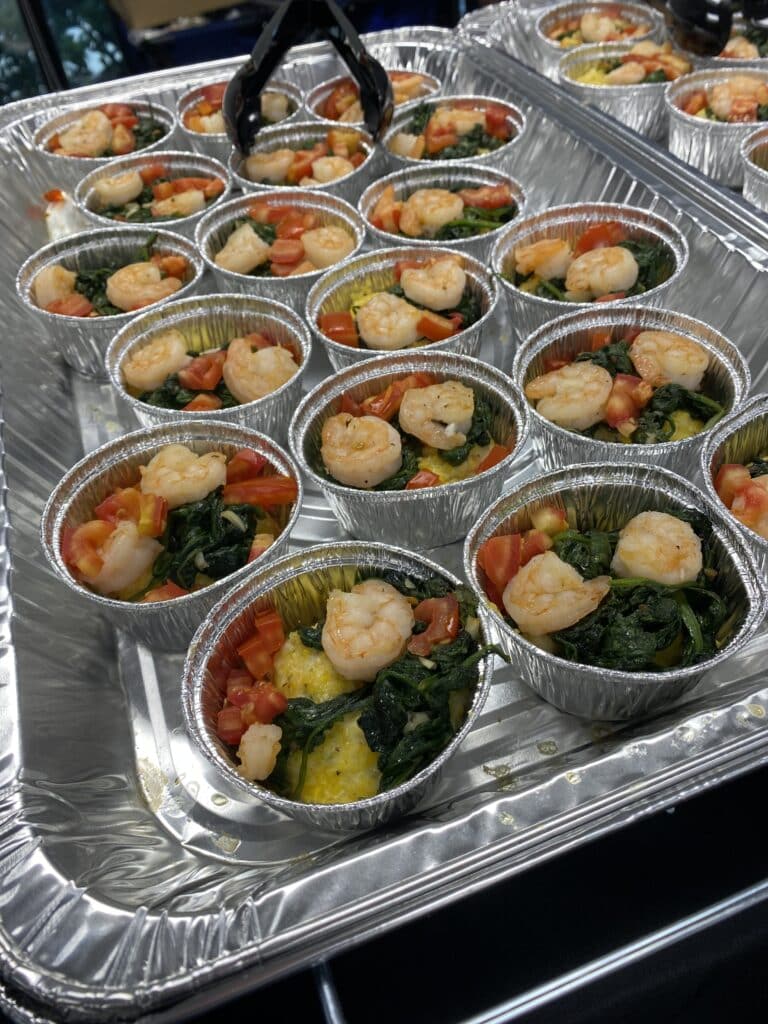
Another familiar face was set up on the other side of the room. J.R.’s Log House Restaurant served southern favorites like pulled pork sliders, baked beans and mac n’ cheese. I couldn’t pass this one up. The pulled pork was tender, tangy and saucy. Exactly what I want from a barbecue. Lazy Dog’s table really impressed me with its presentation. The tuna cup with rice, avocado and chili with chips on the side, was a real stunner.
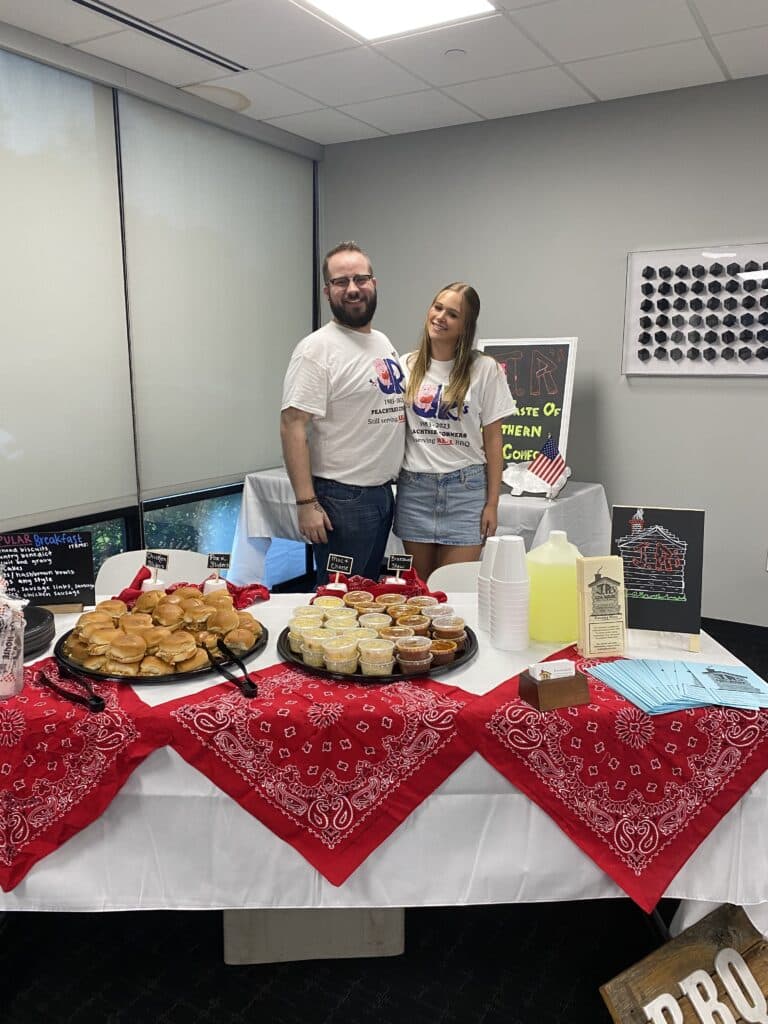
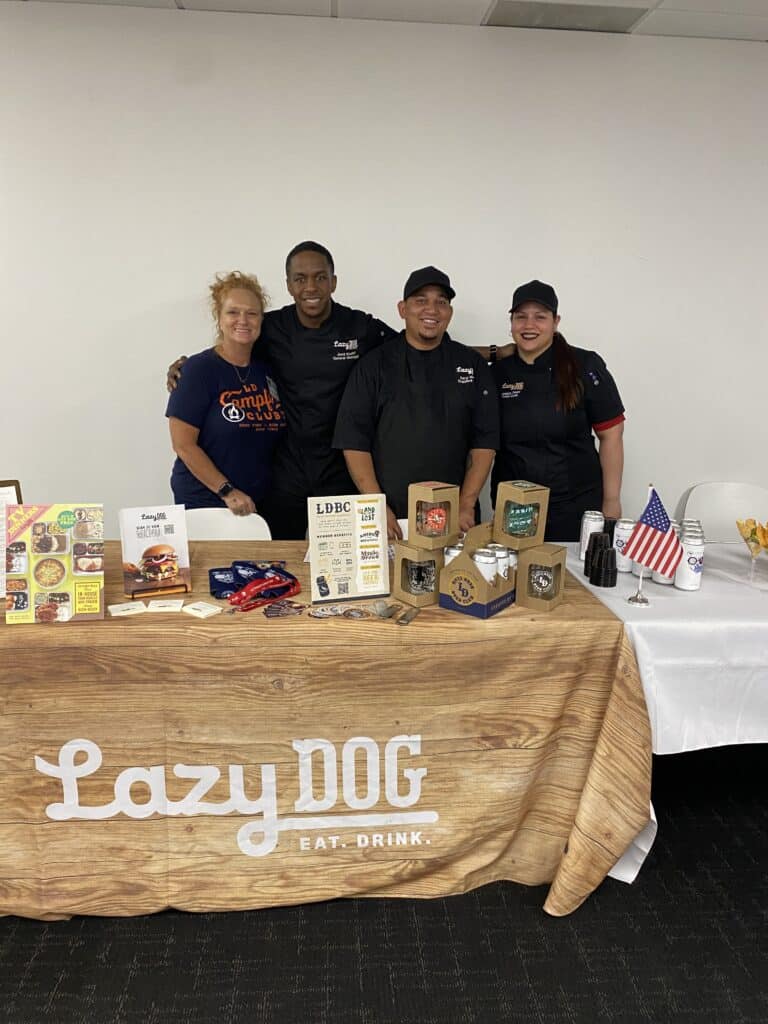
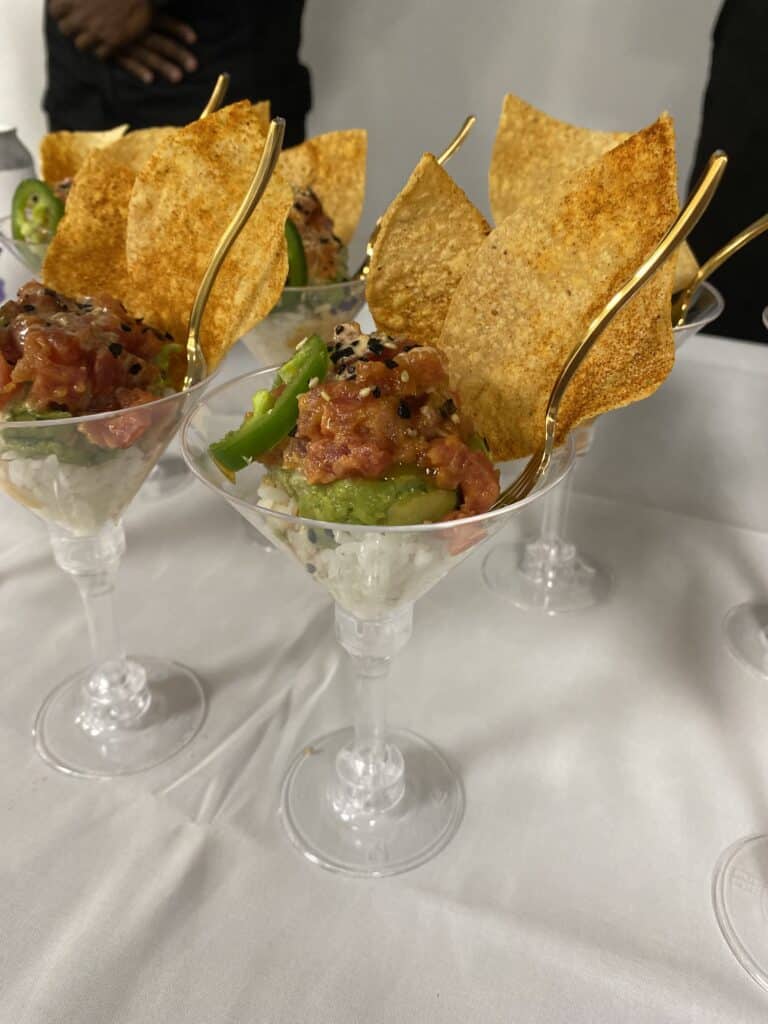
Moe’s Southwest Grill was also on-site handing out tasty tequila lime chicken with rice, avocado, and black beans. This super hearty and comforting entrée was followed by a seafood course from PECHE Modern Coastal. Crab cakes with a croissant pinwheel, roasted garlic and lemon aioli and arugula were on the menu and the flavor combinations were simply fantastic.
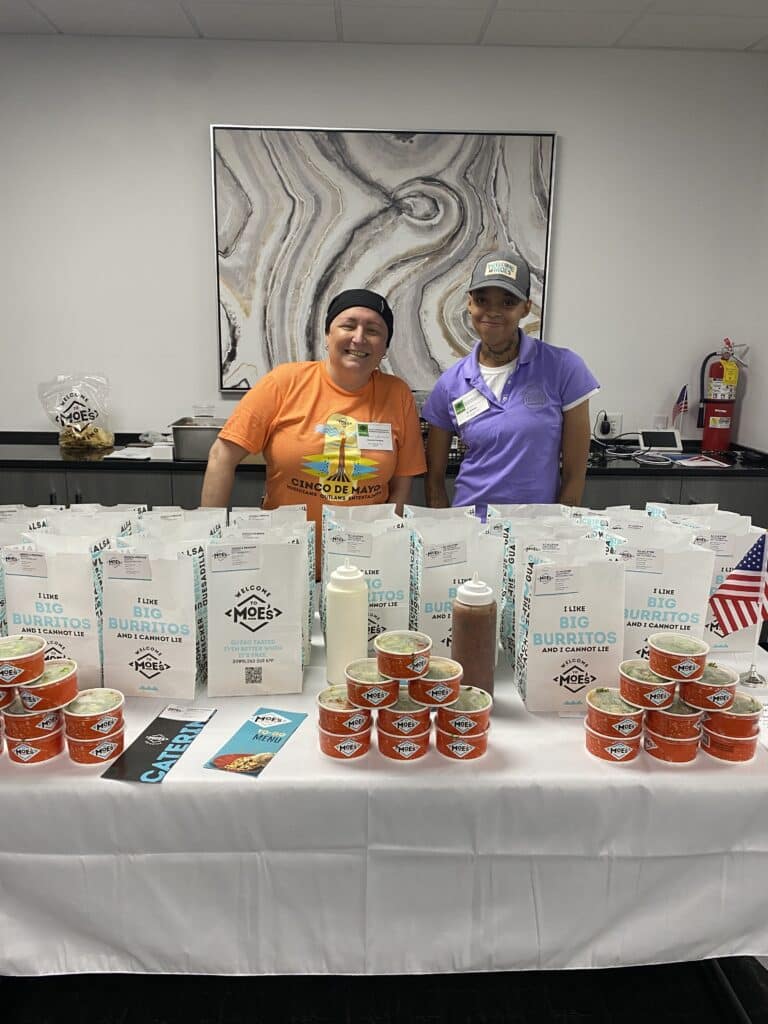
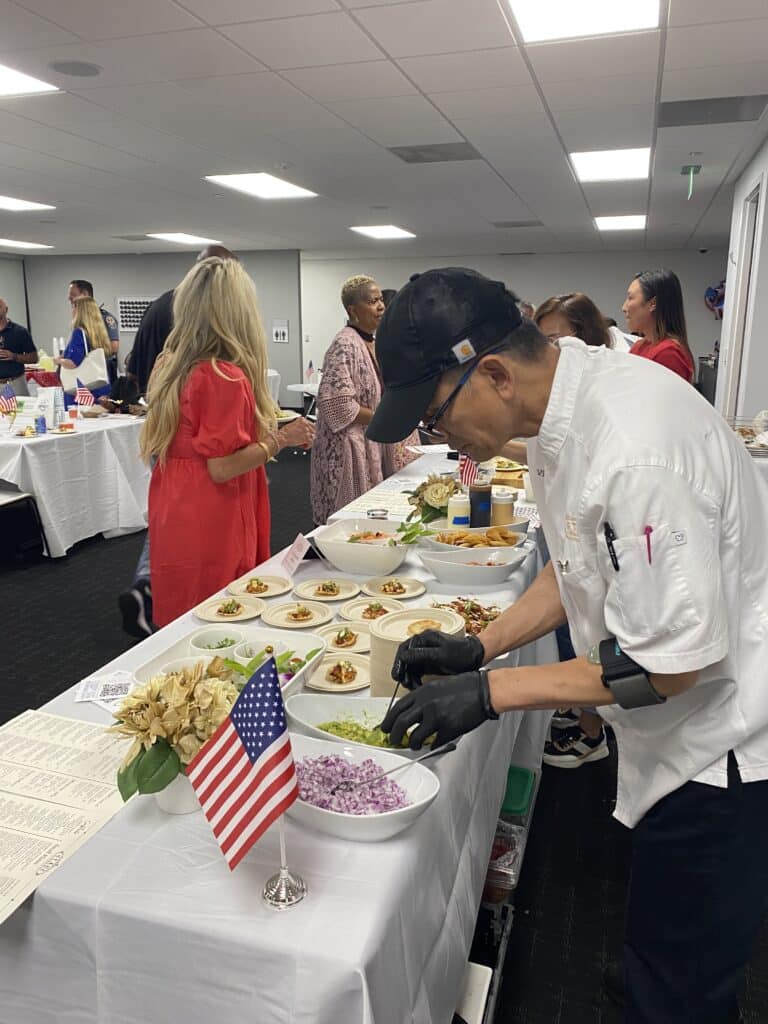
PECHE’s sister restaurant STAGE Kitchen & Bar was next door offering a tuna and salmon tostada with avocado, eel sauce, spicy mayo, and cilantro. This was easily one of my favorite bites of the night. The tostada was crunchy and light with clean and bright flavors. No kidding, I could probably eat this every day for lunch.
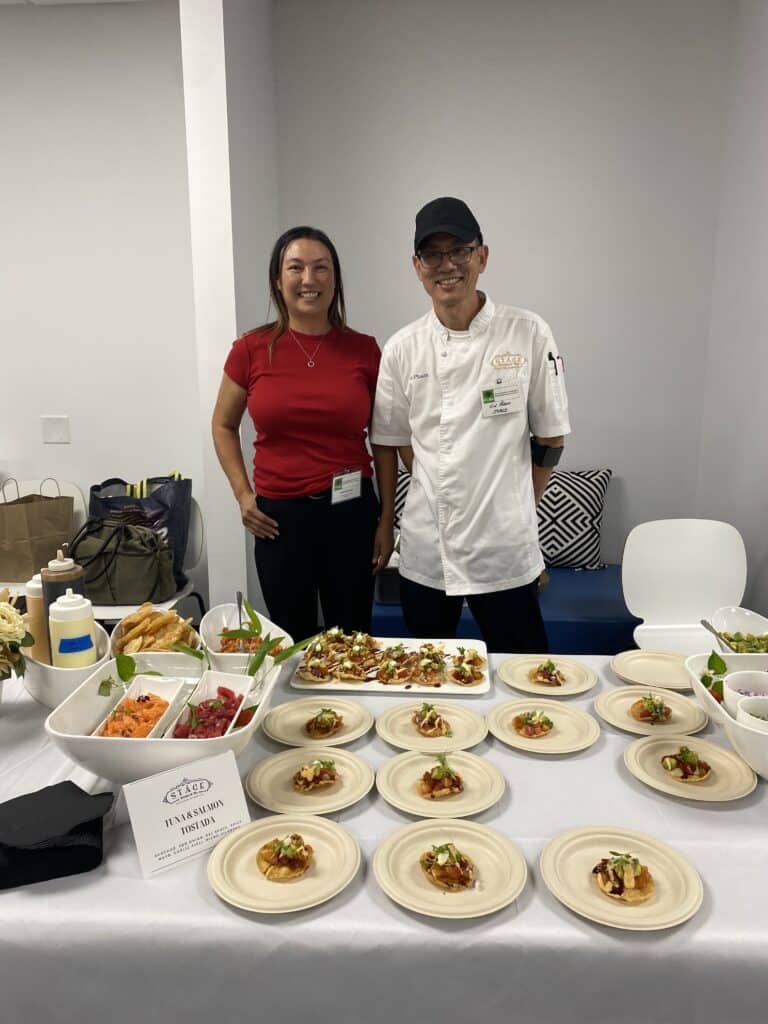
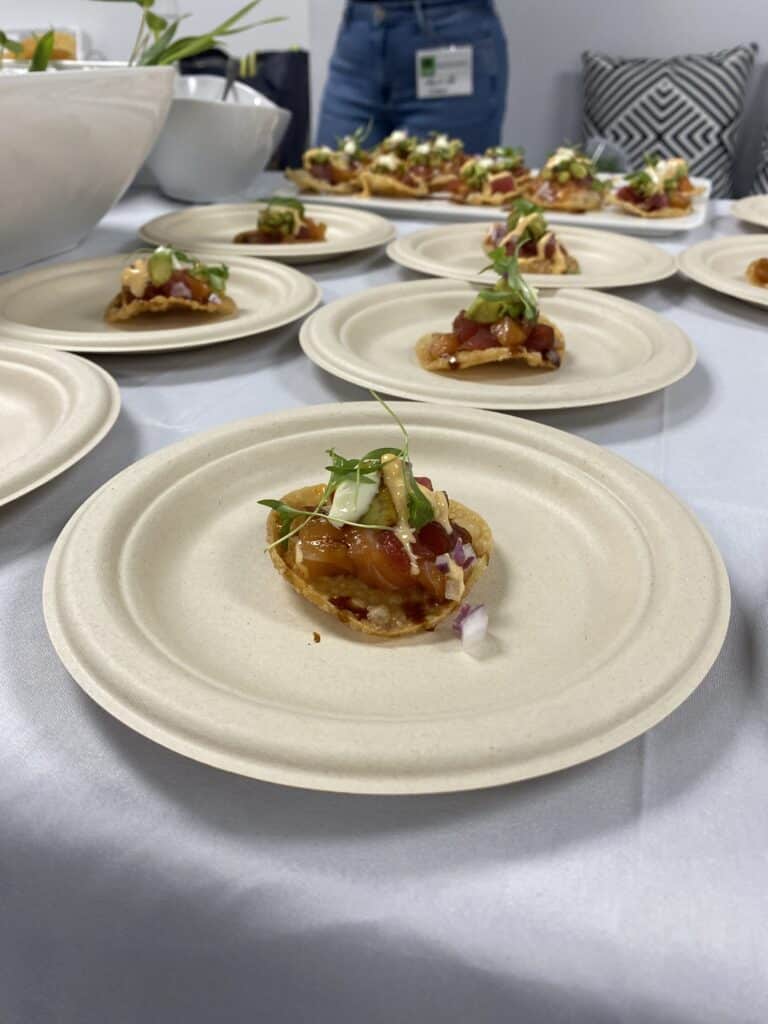
I moved on the Smoke’s Family Catering and owner Phillip Smoke had whipped up enough barbecue to feed an army. I had the pleasure of trying the smoked chicken with potato salad and it was the perfect pairing. Last but not least: dessert. I capped off the evening with a beautiful chocolate ganache-filled croissant with perfect lamination and flaky texture.
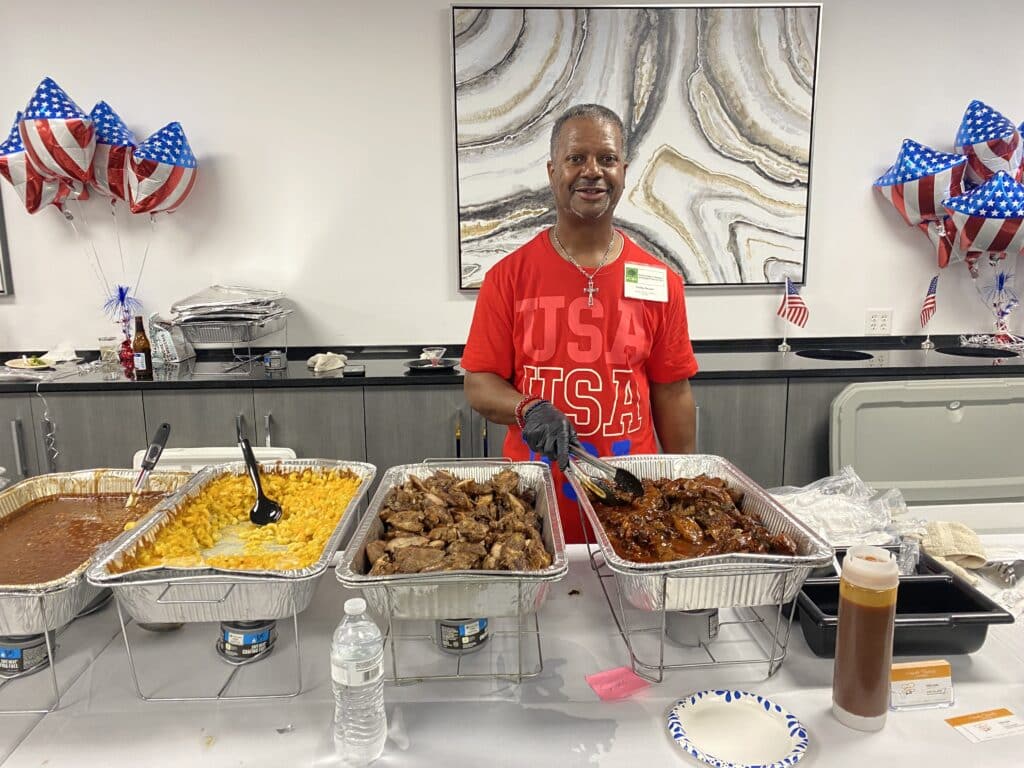
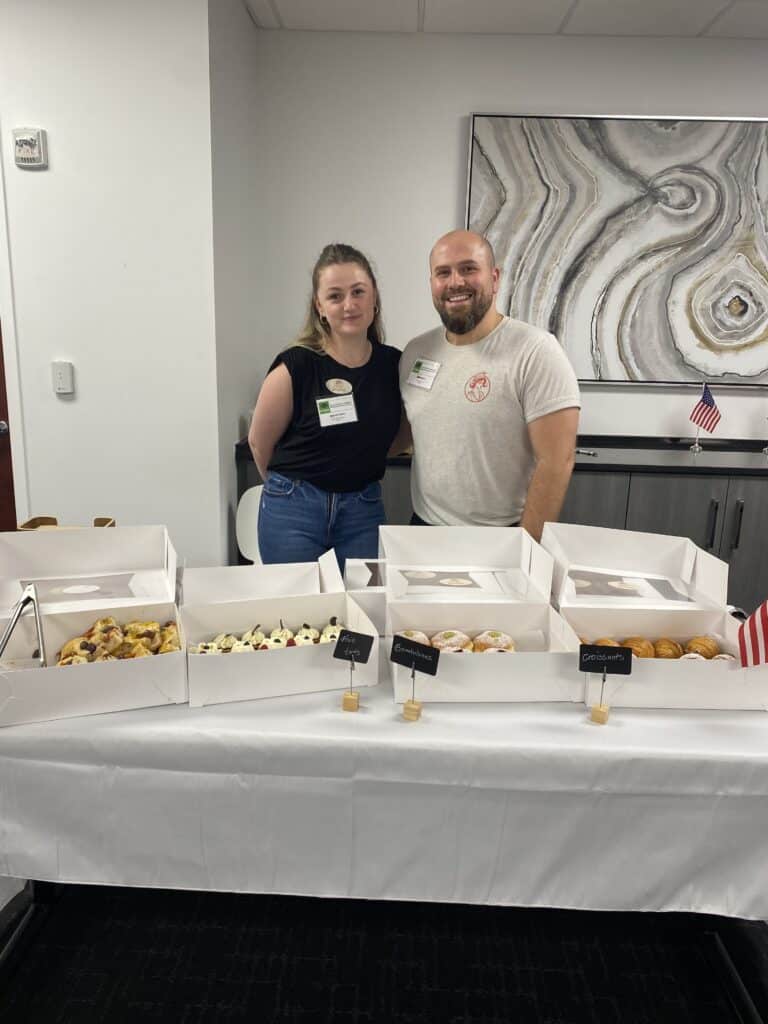
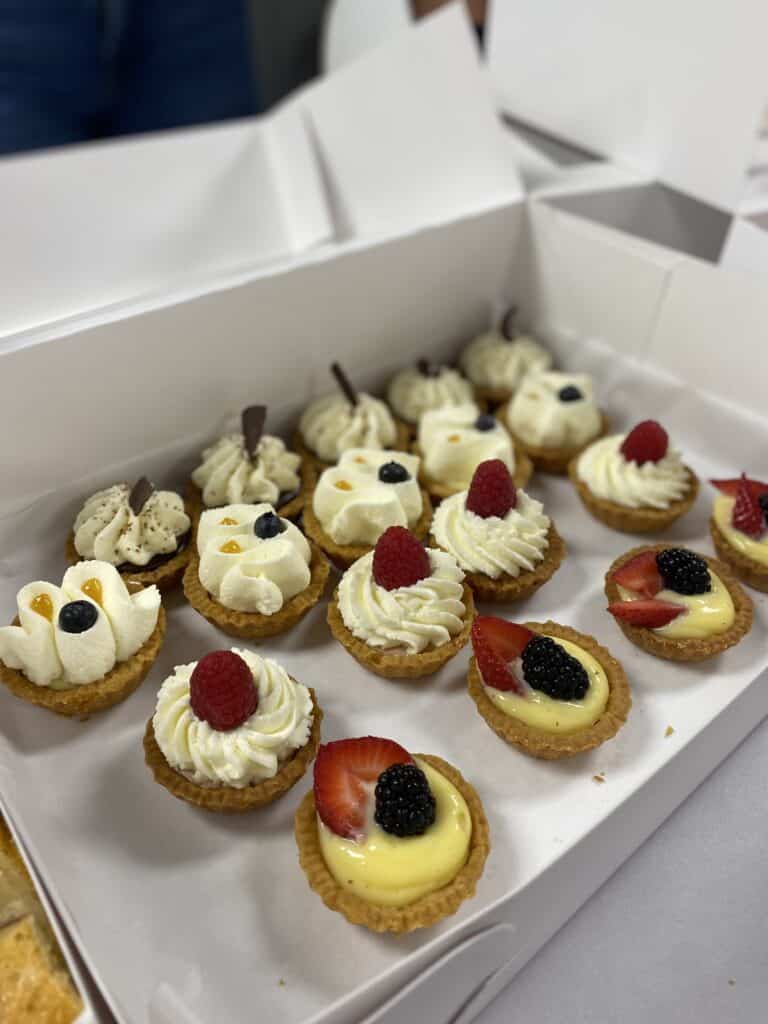
The inspiration behind the event
With a (very) full stomach, I caught up with PCBA President Lisa Proctor to talk about the event.
“We knew that COVID was really hard on a lot of our restaurants to get people back in,” said Proctor. “We wanted to do it in June because we wanted to celebrate our military. Everybody remembers them maybe on Memorial Day or different things, but June is the 80th anniversary of D-Day.”
“The military is always close to our heart,” she added. “We’re also very proud of our restaurants. They all have gone above and beyond.”
Tonight, the PCBA was honoring the Armed Forces and its brave veterans while bestowing two donation checks to very worthy causes.
The first check for $500 went to Folds of Honor. Since 2007, Folds of Honor has provided life-changing scholarships to the spouses and children of America’s fallen or disabled military. And now, their mission expands to the families of America’s first responders.
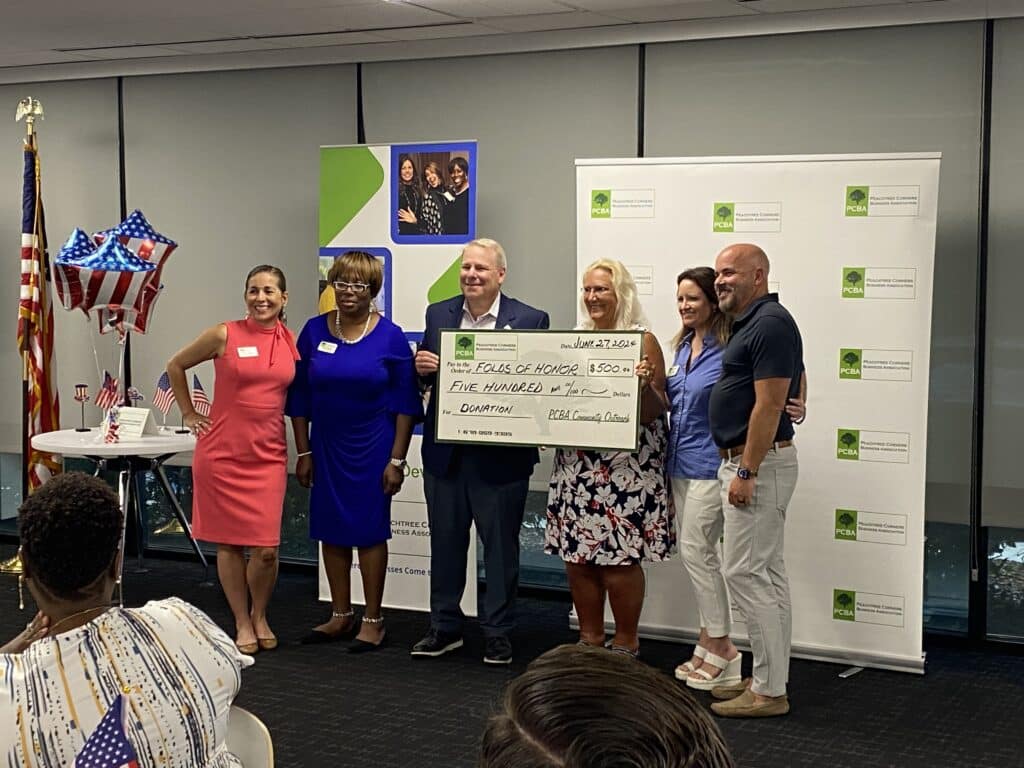
The second check for $500 was given to Light Up the Corners, a 501(c)(3) volunteer organization with an annual glowing, flashing, blinking, shining, nighttime running party and fundraiser in one. All proceeds from the event go to benefit less fortunate children and families in the Peachtree Corners community who are struggling by giving them the chance to participate in life-enhancing programs and activities at the Fowler YMCA.

Over the past 12 years, the PCBA has awarded 19 scholarships and donated more than $156,000+ back to the Peachtree Corners community.
Related
Business
Local Resident Opens AtWork Location in Peachtree Corners
Published
2 weeks agoon
July 10, 2024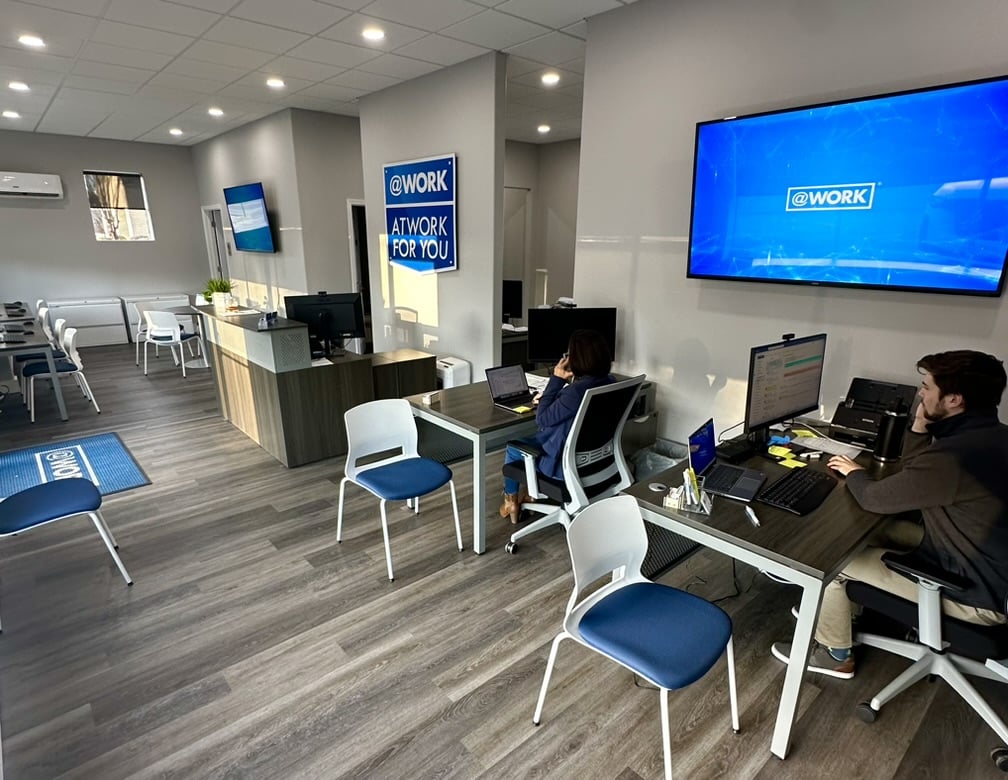
AtWork, one of nation’s leading staffing franchises, has opened its third Metro Atlanta location in Peachtree Corners, Georgia at 6185 Buford Highway, Suite E-100.
AtWork Peachtree Corners is locally-owned by Kamal Bhatia, an immigrant from India with decades of experience in hospitality and as the Senior Vice President of Operations of Atlanta-based Action Bartending School.
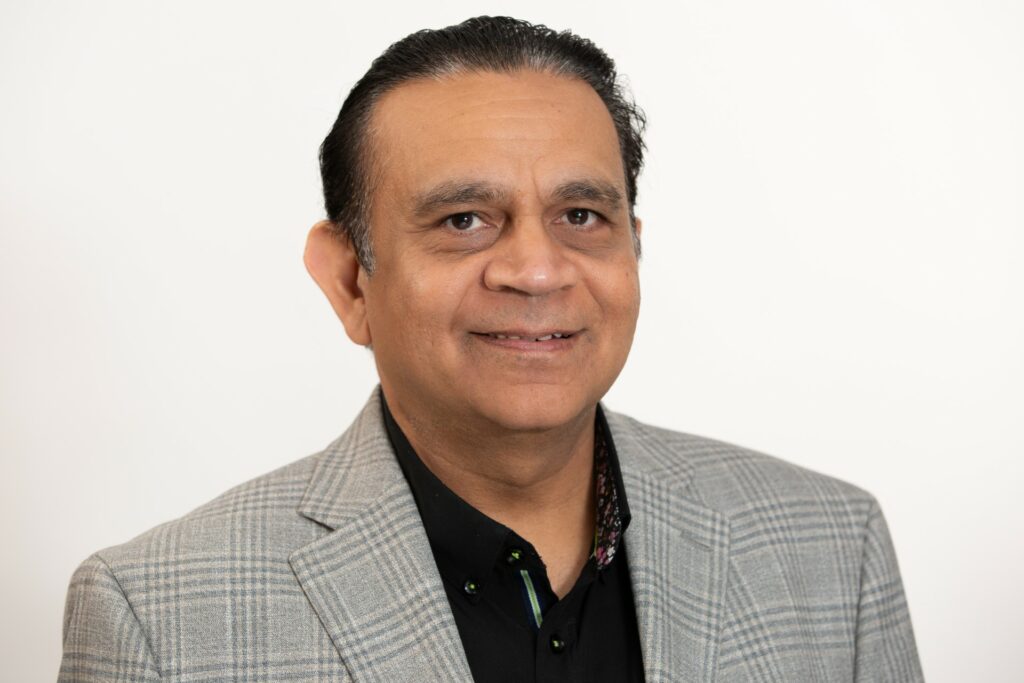
“There is an incredible need for AtWork’s services in Peachtree Corners,” said Bhatia. “Since migrating here in 1996, I’ve witnessed Atlanta evolve and sprout new communities north of the city, including my own. Peachtree Corners has become a hub for thriving businesses, and my goal with this location is to be a key resource between companies and job seekers to support the continued growth of our local economy.”
Bhatia’s son and daughter will assist him in the business.
“This is an opportunity to create a legacy company to ensure our community is supported for generations to come,” he said.
For more than three decades, AtWork’s mission has been to connect people with jobs and jobs with people. With more than 100 locations nationwide, AtWork puts nearly 40,000 individuals to work each year in administrative, light-industrial, accounting and finance, hospitality, IT and management-level positions at some of the nation’s largest and most recognizable companies.
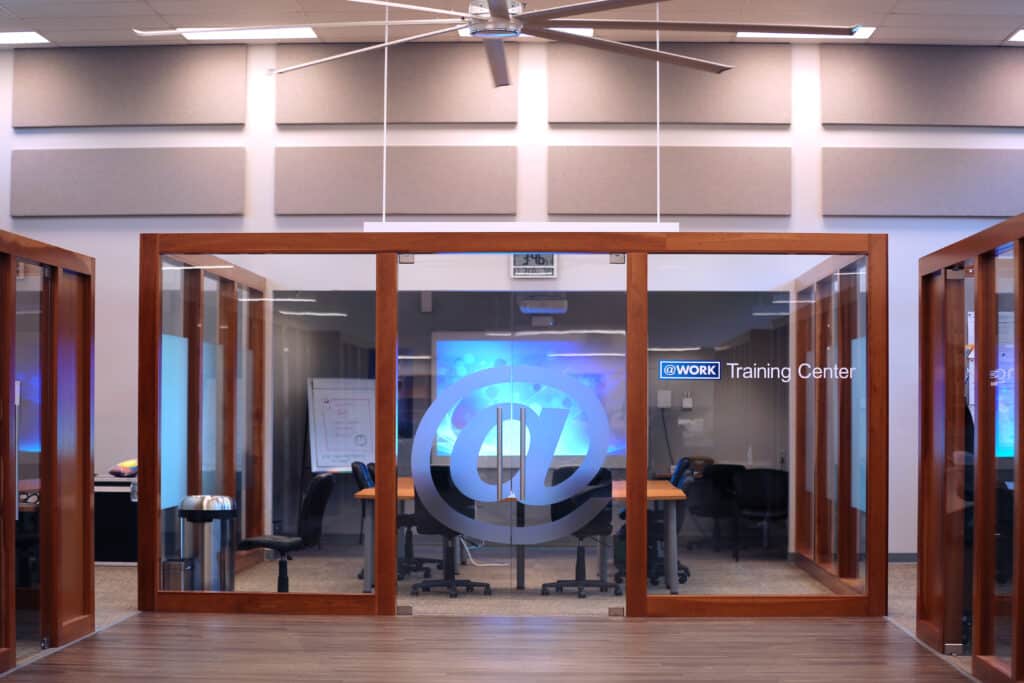
“We’re proud to open our doors in Peachtree Corners and provide a common place for both job seekers and growing businesses to turn for staffing solutions,” said Jason Leverant, President and COO of AtWork.
“AtWork will serve as a key resource to help employees thrive, businesses prosper and communities flourish. Kamal is the perfect partner to champion our mission and be a servant leader in her local community,” he added.
Related
Read the Digital Edition
Subscribe
Keep Up With Peachtree Corners News
Join our mailing list to receive the latest news and updates from our team.
You have Successfully Subscribed!

Taste of Peachtree Corners: PCBA Showcases Local Restaurants

What’s going on at Jones Bridge Park and the Challenges of Urban Development

The Forum Gives Sneak Peek of New Eateries and Community Spaces

Southwest Gwinnett Mayors Share Visions for the Future

Peachtree Corners Shines Bright with Light Up the Corners Glow Race this August

8 Events Happening In and Around Peachtree Corners This August

Peachtree Corners Shines Bright with Light Up the Corners Glow Race this August

The Forum Gives Sneak Peek of New Eateries and Community Spaces

8 Events Happening In and Around Peachtree Corners This August

Southwest Gwinnett Mayors Share Visions for the Future

Taste of Peachtree Corners: PCBA Showcases Local Restaurants

What’s going on at Jones Bridge Park and the Challenges of Urban Development

Local Resident Opens AtWork Location in Peachtree Corners

CHRIS 180 Expands its Services into Gwinnett County [Podcast]

Light up the Corners [Video]

Capitalist Sage: Business Leadership in Your Community [Podcast]

Cliff Bramble: A Culinary Adventure through Italy

Top 10 Brunch Places in Gwinnett County

A Hunger for Hospitality

THE CORNERS EPISODE 3 – BLAXICAN PART 1

Top 10 Indoor Things To Do This Winter

The ED Hour: What it takes to Remove Barriers from Education
Peachtree Corners Life
Topics and Categories
Trending
-
Business1 week ago
Taste of Peachtree Corners: PCBA Showcases Local Restaurants
-
Business2 days ago
The Forum Gives Sneak Peek of New Eateries and Community Spaces
-
City Government4 days ago
Southwest Gwinnett Mayors Share Visions for the Future
-
Community2 days ago
Peachtree Corners Shines Bright with Light Up the Corners Glow Race this August






